BegendingAgain

Gustave Doré: Don Quixote amid his fantasies of chivalric romance, the frontispiece to the 1863 Paris Hachette edition of Don Quixote.
"The Pilgrim travels to find himself. He was lost when he left and hoped to be found by fleeing into something greater than he ever was or ever hopes to become. A reckoning occurs along the way, a reconciling, shell with self, restoring something somehow formerly lost along the way. It never matters why." From Pilgrimage, the first WhatNext Posting, 9/21/2020
"Is it ending as I intended?"
I never seem to know how to begin or end anything. I prefer continuums, endless loops, Ouroboroses forever nibbling their own tails. I don't spring cleanly out of any starting blocks. I likewise tend to miss the moment when I cross the finish line, continuing races longer than strictly necessary for them to end. I behave like Wylie Coyote, forever hatching half-again too clever plans and overrunning my mesa top again and again and again. I label this tendency Begending, a blending of both beginning and ending, neither, really, and also both. I deeply respect the inherent ambiguity experience brings, lessons not so much learned as still learning, without convincing conclusions. Impressions remain, mixed in with much inert material. I might wonder forever without ever concluding what any of anything "really" means. As my dear departed friend Jamie used to insist, it was just what it was and, forever, is just what it is, whatever that was and is. The purpose of any Pilgrimage might not be finding the purpose of any pilgrimage.
The purpose of WhatNext might have been its creation, not its conclusion.
Blecknology

Elihu Vedder: Soul in Bondage (1891-92)
" … I wondered what might become of me next."
As I was driving by a tiny one bedroom cinder block ranchette, I saw through the front window a flat screen television so enormous that anyone watching it would have to stand in the yard across the street to gain adequate focal distance to see the action on it. Technology possess this sort of strange attraction. It seems as if the specs outweigh utility. We presume that bigger (or tinier) must be better and higher definition, superior, though in practice, beyond a rather modest level of clarity, television becomes increasingly unbelievable, like those old 'shot on video' movies where everything seemed in shockingly sharper focus but lacked a proper patina. When color began replacing black and white in film, the purpose of the medium flipped. It's no real trick to recognize anything represented in black and white, and many details irrelevant to the purpose of the production become much more prominent with color representation. The story usually suffers, becoming more spectacle than substance. The purpose was never perfect representation, but performance and meaning. There's little entertainment value in being able to pick out nose hairs on the bad guy's horses as they race by on the screen, or so it might seem. Meaningless prevailed.
Once that focal point shifts from the purpose of the performance toward higher-definition superficialities, more than an essential subtlety gets lost.
EmptyNexting
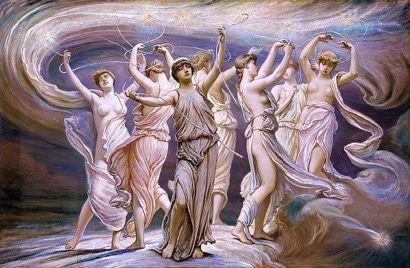
Symbolist painter Elihu Vedder: The Pleiades (1885)
" … not yet at the end of my hopefulness, either."
Change, Family Therapist Virginia Satir insisted, rests upon the clear, albeit temporary acceptance of the way things are. I might anticipate, even project futures, but I will be wise to consider that whatever differences might emerge next will have extended from whatever came before them. Though life sometimes seems terribly disjointed, connections remain no matter how disruptively any future seems to manifest. One probably never successfully escapes one's roots, nor need to. Still, I live a considerable portion of my life in anticipation, warm or chilling, and rarely solely within any moment. With three short days—the shortest days of this year so far—remaining in my WhatNext Series of writing (this waning quarter's focus of my writing), I'm still anticipating what might come next. I deliberately avoided originally posing my WhatNext as a question, but as a purposefully ambiguous statement which might, in certain light, certainly seem like a question, but in others a benign label or even an exasperation. Notice how it's lacking punctuation. WhatNext has certainly proven to represent each of those sentiments and more.
This time has seemed a period which rendered prediction not necessarily impossible, but at least unbelievable, or perhaps simply difficult to believe.
ProHibitions
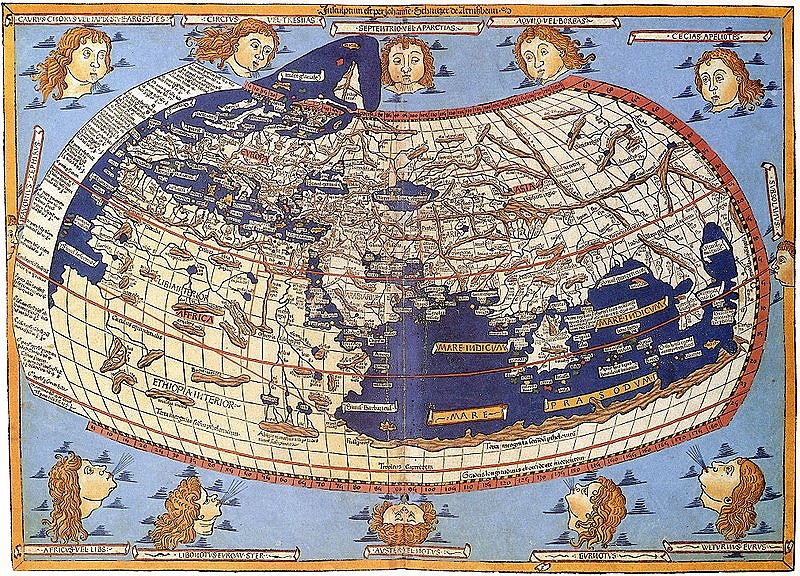
Lord Nicolas the German (Donnus Nicholas Germanus), cartographer
Johann the Blockcutter of Armsheim (Johannes Schnitzer or Johannes de Armssheim), engraver:
The world map from Leinhart Holle's 1482 edition of Nicolaus Germanus's emendations to Jacobus Angelus's 1406 Latin translation of Maximus Planudes's late-13th century rediscovered Greek manuscripts of Ptolemy's 2nd-century Geography.
"I preemptively infringe upon my own freedoms so nobody else has to."
By the time someone gets to my advancing age, they've probably produced a long list of personal ProHibitions. Some came from well-intended professionals' advice, but most evolved into being, based upon emerging convictions and experiences. I learned at seventeen that there's nothing much worth discovering at the bottom of any bottle of Southern Comfort, the most misleadingly named beverage in the history of human civilization. I learned how to smoke before I learned how not to. Learning not to proved way harder, as it seems for many things. Bad habits are first good habits, or, if not necessarily good habits, they universally seem like good ideas at the time. They show their insidious side later, after they've weakened your resolve. They might do it that way for the sheer entertainment of it.
I've been collecting cautionary experiences since I started experiencing.
Ease
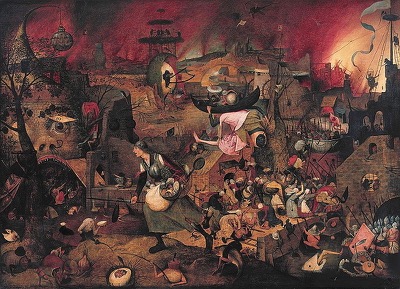
Pieter Brueghel the Elder: Dulle Griet [Mad Meg] (1563)
"If it's really important, I ask The Muse to run the gauntlet …"
Much has been made of the Ease of online shopping. I cannot validate this claim because online shopping still seems to me the very antithesis of Ease. This Damned Pandemic Lockdown reinvigorated my online shopping curiosity, though, so I've recently been reengaging to learn if anyone has engineered any Ease into their interfaces. I'm the guy who, when checking out at Whole Foods® explains that he has not (yet) figured out the Amazon One-Click® app yet. They either take my word that I'm a member, the person in line behind me loans me their identity, or I just take along The Muse, who just seems to know how those sorts of things operate. Amazon has long held my admiration for the absolute hostility of their user interface, which seems more hazard to commerce than intelligent assistant. Their design became the burgeoning online shopping industry's standard for online commerce, effectively disqualifying me from participating. I'm usually beyond caring.
The vacuum died last weekend, so I went online shopping for a replacement.
HesitantLede

Moses: Woodcut from a single-sheet print by the Memmingen printing company Kunne (15th century)
"I'm cheering for some serious foot dragging next."
Most accounts characterize Moses as a distinctly hesitant leader. He was forever fleeing into his meeting tent to confer with The Almighty, continuously uncertain about his next move, his people endlessly complaining about his leadership. He seemed to fake it a lot. Some translations report that he remained unaware that his face exhibited a certain radiance obvious to anyone who met him, but apparently not reflected in any mirrored surface. He doubtless led his people and even survived a face-to-face audience with God, but he comes across as an inveterate foot dragger. How else could it have possibly taken forty and more years to cross the freaking Sinai, which is just over two hundred klicks wide? Baby steps? Yea, baby steps.
When the word leader comes up in polite conversation, though, it seems most likely that one might attach a different connotation.
TheEnemyWithin

Peter Paul Rubens: Massacre of the Innocents (1611–12)
" … getting even only leads to slaughtering innocents …"
They goad. They spout gibberish. They firmly believe in flimsy fictions and claim to be prepared to lay down their lives to defend them. I imagine that they performed poorly in school and so felt demeaned there. The elites who harshly judged them in class became evidence of an upper class to which they would be forever denied access. They took menial jobs, ones which only almost paid the bills. They did the heavy lifting whenever an elite got a bug up his ass. They actually fought the wars without purpose. They witnessed their comrades' deaths. Perhaps they acquired a first class case of Post Traumatic Stress Disorder which just added another layer onto an ever-growing grudge. They believed that owning guns was both an honor and a right, a little something to equalize what had always been an unfair fight. They vowed to fight. They exclusively slaughter innocents, innocence.
They goad to take the upper hand.
TheNarrator

Anonymous: Diogenes brings a plucked chicken to Plato. (19th century)
According to Diogenes Laërtius’ third-century Lives and Opinions of the Eminent Philosophers, Plato was applauded for his definition of man as a featherless biped, so Diogenes the Cynic “plucked the feathers from a cock, brought it to Plato’s school, and said, ‘Here is Plato’s man.’ ” When asked about the origin of his epithet, cynic deriving from the Greek word for dog, Diogenes replied that it was given to him because he “fawns upon those who give him anything and barks at those who give him nothing.” From Lapham's Quarterly
"I might need some serious slowing down after this."
It's long been considered wise counsel to understand who's whispering into one's counsellor's ear, for those people narrate that counsellor's experience, often without the counsellor acknowledging the influence. The much-touted still, silent voice, which originates inside, actively interprets, while TheNarrator represent a world pre-interpreted for easy absorption. This Damned Pandemic has rendered my library inconvenient to visit so I've been supplementing my Wreading with audio books. I've been noticing that I listen less critically than I read, as if intaking through my ears bypasses some gatekeeper in my brain. I find fiction even more believable when listening. I find non-fiction much more convincing, though I understand that as a "consumer" of literature, I hold a responsibility to be sorting whatever I'm attempting to absorb. Listening seems to bypass my sorting mechanism.
I find distasteful any medium that does not provide me the means for easily skipping ahead or flipping back.
FatteningGeese

Baldassare de Caro: A hunting still life with a goose, ducks, pigeons, songbirds and a dog in a landscape (Early 18th Century)
"On even the darkest evenings, I light a fresh candle."
The olde carol reports that Christmas is coming and the goose is getting fat. Hardly headline news, that. Feed a goose a freaking dandelion and it will turn that weed into the finest, silkiest Schmaltz. The carol might have more usefully proclaimed that Christmas is coming and you're getting fat, for a human's metabolism seems to shift into goose mode as the winter's holidays approach. Truth told, few of us even try to subsist upon a diet of dandelion buds in any season. As snow falls, we, instead, commence to buying heavy whipping cream by the quart and butters and sugars we haven't bought since this time last year. We refer to our excesses as cheer, which beats drowning them in remorseful tears. We can save our remorse for Lent, wherein we can regret what might seem, there on the cusp of spring, a serious personal shortcoming visiting around Solstice past. In this moment, hearts sing without the slightest sensation of any impending smothering. We have no interest in balancing anything. Let church bells ring, we're celebrating!
Our genome remembers those times before the advent of central heating, when survival required defensive fat layering.
AgingInPlace
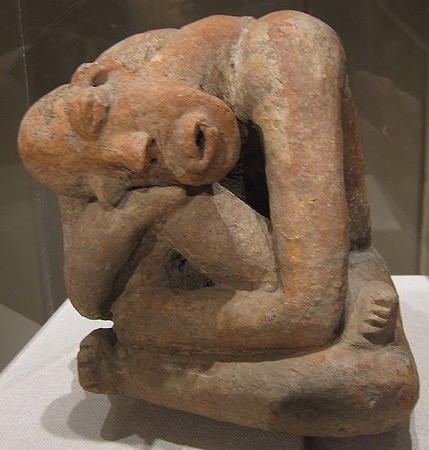
Seated figure from Mali, Djenné peoples, 13th century
"Can anyone hope to outrun their fate when AgingInPlace?"
Americans seem a mobile people. Born to migrate, we've always been quick to ditch. We once referred to this tendency as our manifest destiny, which roughly translated into a firm belief that we can only manifest our true selves if we're somewhere else. We identify our sense of place as 'there', definitely not here or even the Old Home Place, and, no, we're still not there yet. We grow up and move away, relocate for professional advancement, even pull up roots at retirement to make another in a seemingly infinite series of attempts to finally locate our ultimate Promised Land. Arriving, though, we find dissatisfaction co-locating again, so we spend about a quarter of each year traveling to see somewhere else, anywhere else, really. We maintain bucket lists of our bucket lists, the purpose of which seems to be to fuel our pleasing dissatisfactions. Here has always seemed more distraction than destination. We ache to be on the road again.
So when This Damned Pandemic came calling and our well-intended public servants started recommending just staying home, a collective, mournful moan arose from at least half of our populous.
MakingHistory
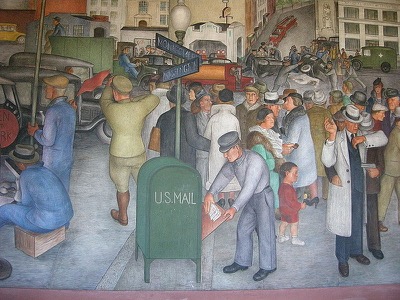
Victor Arnautoff: "City Life" mural, Coit Tower, San Francisco (1934)
"The pointy end trails a very long tail which will never become any different."
Maybe it's an effect of This Damned Pandemic, but I've been catching myself daydreaming lately, frequently. I'll find myself floating in the hallway of my elementary school, surrounded by everything that seemed so unexceptional then. It all seems golden now. The absence of a normal routine might have been forcing me into reliving past ones which all seem like history from here. I do not know how they made that transition into golden past because at ground level, the whole show seemed continuous, flawless. Everyone and everything fulfilled their role perfectly, each precisely as they eventually would become, each act somehow frozen in time yet still convincingly fluid. I remember considering attempting to capture on film the place and time where I came of age, but I never found the time to take those pictures when I was still imbedded within that familiar frame. What seemed normal, even banal then has since become the stuff of barely believable legend. Almost nothing survived intact—I know that I certainly didn't—yet my daydreams seem so crisp and clear that when I finally snap out of one, I can't quite believe that I'm here and not there. I might be both.
I conclude that we're each MakingHistory every blessed second.
SliverBullets
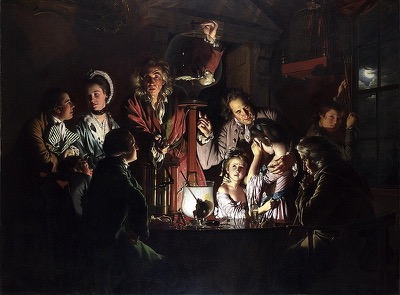
Joseph Wright: An Experiment on a Bird in the Air Pump (1768)
"If we can maintain faith in infinitesimals, we stand some chance."
Invite a halfway decent project manager to a project meeting or an otherwise innocent pandemic and things tend to quickly seem more complicated. While a team or a society easily focus their energy upon some essentially mythical closure, the project manager's having none of that. She'll start asking "and if you achieved that, where would you be?" in long meandering series intended to get people thinking less superficially. You see, most of us firmly believe in silver bullets, even though experts in every field agree that there's really no such thing. Nothing ends like things end on TV, prominently featuring unambiguously good guys, white horses, or native sidekicks. Silver bullets prove impractical for reasons beyond their obvious expense. Lead's almost twice as heavy as silver, its mass much better suited for bullets. Silver bullets would struggle to accurately hit any target, regardless of the skill of the shooter involved. We each suffer somewhat from a form of Fairy Tale Poisoning, and this toxin serves us very poorly.
We've, for the duration of This Damned Pandemic, maintained a reassuring belief in the eventual emergence of a blunting vaccine which would quickly neutralize the threat.
Shimbolism
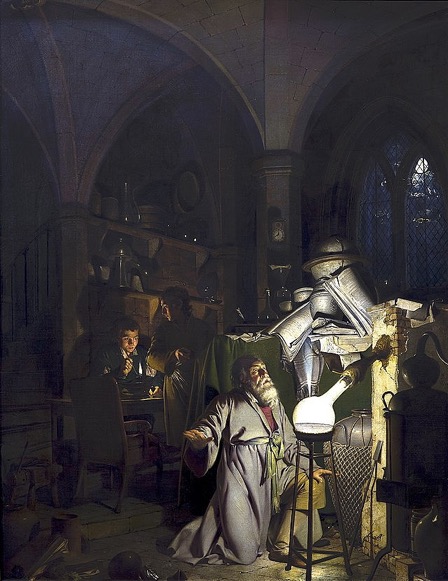
Joseph Wright: The Alchemist in Search of the Philosopher's Stone (1771)
" … not even a cigar is any longer ever simply a smoke."
I admit to no longer being anyone's exemplar of fashion. Few of my garments feature a manufacturer's label, and I did not purchase those to publicly promote my good taste, for I consider any visible manufacturer's label in extremely poor taste, the most primitive form of self promotion by back-handed association, as if Ralph Lauren were somehow personally vouching for me because I'm impractical enough to pay an inflated price for a shirt with a prominent logo in lieu of a front pocket. I'm unable to successfully translate the seemingly subtle cues which, I'm certain, were supposed to clue me in as to with whom I'm having the pleasure of meeting, a form of qualification. My eye can discern a well-cut worsted from a polyester wannabe, and I admit to projecting significant meaning upon each, but most of the rest of the code seems as alien as any avian mating ritual, mere flash and feather. I do understand that it's become somewhat of an imperative now for one to suit up for public display. The message on a hat might make a real difference to some, but I never swallowed the notion that wearing a hat might make anything great the first time, let alone over again.
My usual wardrobe amounts to the same damned thing worn over and over and over again, with no underlying meaning ever intended, other than that it's clean and somewhat well-fitted.
Workarounds
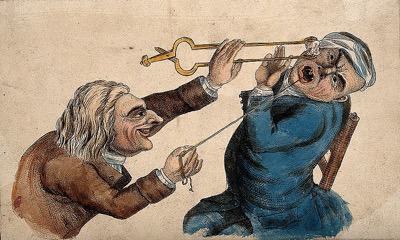
Coloured etching by J. Collier after himself:
A sadistic tooth-drawer frightening his patient with a hot coal causing him to pull away violently and extract a tooth. (1810)
"Not all Workarounds are created equal."
Anything retained long enough becomes the sum of its sustaining Workarounds. Older cars have lost several of their factory-installed features, replaced by alternative parts, some of which might have even been designed to serve the purpose for which they're employed. Exact replacements cannot always be located, so an inventive or desperate mechanic or DIY owner jury-rigs something and calls it good enough. These fixes proliferate as something ages. Houses accumulate a variety of sins to their original design, often under the aegis of "home improvement." Some actually improve something, though many more likely simply prolong a desired utility without much regard for aesthetics. Remodeling, in addition to adding a few new ones, inevitably becomes a revisiting of many prior sins, many of them, I've always suspected, concocted late some Sunday evening when something critical failed. Few come back Monday morning to improve any quick fix. A remodeler repeatedly wonders, "What were they thinking?"
The chances seem good that they were not thinking at all, but reacting.
SecretLife
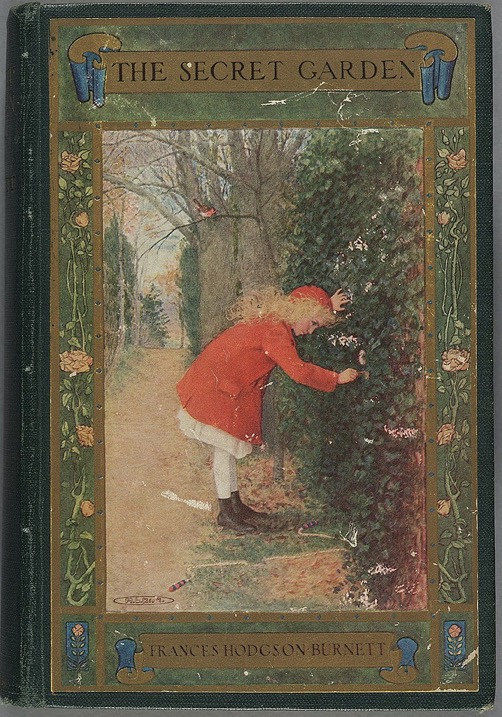
Maria Louise Kirk: Cover Illustration for the 1911 American edition of Frances Hodgson Burnett's The Secret Garden.
" … mostly redactions in any transcript."
I live three simultaneous lives: a public, a private, and a secret one. I might refer to my public life as my nine-to-five life. It entails my out-there encounters. My private life's the one I primarily live at home; me and my family're privy to this one, along with my very closest friends. My SecretLife includes all my activities I mention to nobody, ever. It includes more than nose-picking, and entails much of what I find embarrassing to tell. We each maintain all three of these lives, in varying proportions and degrees. A mid-career professional might allocate much more than half their time to maintaining their public presence. Newlyweds slip into full time private time when they depart on their honeymoon, then, over time, allocate a much smaller proportion to engaging in their relationship. Through it all, we each maintain at least a small part of every day to our secret activities, if only for the sake of maintenance. Nobody ever gets to watch me shave. I understand that some families (shudder) maintain an open door bathroom policy which both my privacy life and my secrecy life abhor. I'm a dedicated bathroom door closer, myself.
During normal times, a rhythm emerges and seems to maintain itself, with public, private, and secret times seeming to balance themselves.
NewNormalScene
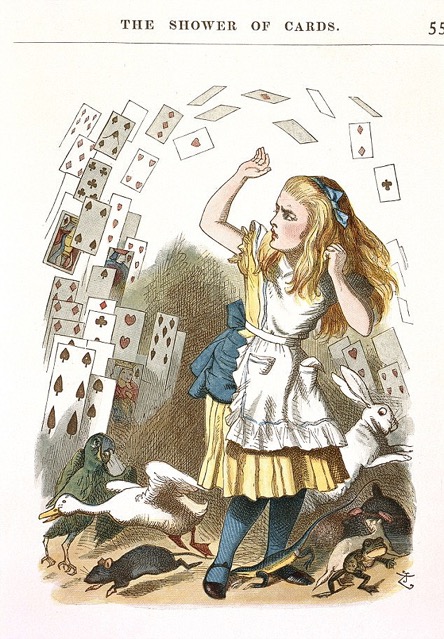
A shower of cards in Alice in Wonderland from the color illustrated Nursery Alice published in 1890 with illustrations by John Tenniel
" Coping must mean that I'm still noticing differences without taking them as necessarily definitive."
If there's an art to adapting, it's for certain a dark one not taught in any higher learning institution. It seems a low sort of learning, imposed rather than chosen, and however much I might crow about my own resilience, I can assure you that it's all bullshit. There never were any masters of resilience and not only because there never could have been. You see, mastery demands an object exhibiting certain replicabilities, patterns emerging at least somewhat regularly, where practice might prove possible. Nobody ever improves their innate ability to predict what random number might emerge next. Likewise, each emerging NewNormalScene will likely never seem completely normal. Nostalgia taints assimilation. One cannot help comparing and finding the new thing wanting. These days never seem very much like the good old ones.
Saturday morning comes and I still feel a reassuring compulsion to head over to Davey's Diner for a platter of loaded hash browns.
Complaintant
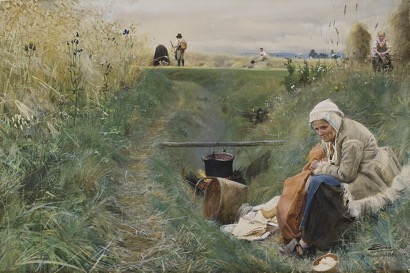
Anders Zorn: Our Daily Bread (1886)
" … I'm just blowing off stink."
I try not to whine, which under the Negative Objective Rule, means that I catch myself complaining more than I care to openly admit. Just between us, then, I admit to having a hyperactive internal complaint department operating 24/7. It never closes. I occasionally more publicly disclose its workings, but I usually just keep my complaints to myself, if only to demonstrate that I might have been raised right. I learned in my birth family, which featured five kids, just how necessary accommodation tends to be. One complainer can spoil every shared experience for everybody, perhaps most prominently for the complainer. Keep it up, and the belt might come off, encouraged by my mom and administered by my reluctant father, who always preferred to spare the rod, however warranted a punishment might seem. So I graduated into what passed for my adulthood with an advanced degree in stifling, a skill with a spotty record of producing real benefit.
The Damned Pandemic Lockdown has been teaching me complaining's hidden benefit, though.
Widsom

Johannes Moreelse, Vanity (17th Century)
"I might have always been somebody else instead."
If you don't feel crazy sometimes, you're probably insane. The truly insane often feel perfectly sane while the sane only occasionally do. Truth often seems much stranger than fiction and fiction the more readily believable truth. There is no vast world-wide conspiracy trying to convince you that a vast world-wide conspiracy's trying to convince you that a vast world-wide conspiracy's trying to convince you. Nobody's capable of coordinating even a half-vast world-wide conspiracy in a world where most cannot consistently make it to the supper table on time. They're not actually out to get you, though they're very likely to get you, anyway. It's still paranoia, even when nobody's out to get you. Most cannot step into the same river once. Nobody can do it twice. Uncommon wisdom is everywhere, common sense, uncommon. Wisdom is never common. It only comes in the uncommon variety. If you're not confused, you might not be paying close enough attention.
Whoever said that the world should make sense never closely observed this world, for it overflows with absolute nonsense.
Leftovering

Johannes Moreelse: Heraclitus (1630)
"By Epiphany, we will have somehow survived a second surge of Leftovering here."
Was it really just a week ago when I went to bed with my head filled with visions of an impending Thanksgiving dinner? The Muse and I had trundled out to fetch our fresh bird and returned to The Villa feeling supremely well prepared. The Muse had roasted off that little sugar pumpkin, anticipating some pie-making. We tussled a little over whether we should dry or wet brine the bird, a decision I ceded to The Muse, since she would be cooking. We were both salivating in warm anticipation, but that was then. Heraclitus, the so-called weeping philosopher, reveled in pointing out human foibles. He observed much human behavior that clearly couldn't qualify as rational. He noted that the same thing seems completely different from different perspectives while remaining otherwise precisely the same. He might have been foretelling the story of our Thanksgiving, which did, indeed, come the following morning but left a long, long tail behind. Turkey on day six seems a completely different commodity than it did on day one.
Most mornings, when filling the cats' food dish, I wonder if they might prefer a tad more variety in their diet.
Boss

Johannes Moreelse: Democritus (c. 1630)
"If nobody's Boss, it works better."
Anyone who's ever had a Boss has experienced what it's like to work for a complete idiot. This principle counts double for anyone who's ever worked for them self. The hierarchy wobbles top-heavy. If an organization has a cadre of best and brightest, why position them on the head of the pin rather than on the business end, the foundation? A Boss attempts to fulfill a Utopian mission, one rooted in directing others' actions, one doomed to endless short-coming. Nobody told this twenty-five year old budding business executive upon accepting his first supervisory assignment that he would most probably never get the hang of it, that he'd instantly become the most clueless one in the whole damned organization and that he dare not admit it, even to himself. He'd hang in there, pantomiming his own performance while writing performance reviews for people who's contribution he could not have possibly replicated or very deeply appreciated. The more successful subordinates were insubordinate and managed him.
And so it's been through all of my professional life.
Eternals

Hieronymus Bosch, The Garden of Earthly Delights (circa 1490-1510)
"I feel a deep responsibility to maintain a sense of my own eternity."
As near as I can tell from here, we're each immortal until we're not. We each live infinite lives, lives within lives seemingly ad infinitum, right up to the moment when we don't anymore. To understand Eternals, it seems as though one must consider a slightly different from usual interpretation of infinity. Mathematics presumes infinity to be a collection of uncountable things, most often imagined as an overwhelmingly enormous set. They admit that some infinities extend further than others, giving rise to both smaller and larger enormities, but each extends further than anyone can imagine. Eternals last forever but emerge from moments. They hold realized potential and cannot ever be undone. That falling leaf embodies an eternal event which might have happened in many different ways, but didn't. It occurred just as it did and could thereafter never be undone. No do-overs, no mulligans. Each event happens precisely once, eternally.
You and I exist on the leading edge of an ever-changing eternity, for we each hold potentials destined to become Eternals.
Fallowtimes

Altichiero da Verona: Portrait of Francesco Petrarch, from a 1379 copy of the latter's De viris illustribus
"I've been cultivating dreams while inhabiting Fallowtimes since."
After giving and receiving the traditional Thanksgiving gratitudes, Fallowtimes settle in for an unimaginable duration. I might speak then in vague abstractions about last summer or a coming spring, but neither concept really settles in as likely or even distantly possible. A chrysalis too-securely covers my senses. My gardens, past and future, dominate my dreams and even some of my waking times then, for of all my friends, my gardens have seemed both the most dependent as well as the most dependable. Some I feel certain will never return. A few might resurrect, though likely in different forms, but I remember the placements, where the Bleeding Hearts sprouted each spring and where the buttonweeds grew the fiercest. I came to deeply understand each habit and habitat, each frustrating tendency and each payout. I freely submitted myself to their well-being, even when doing so would take too much out of me, for they represented a greater good, an association within which I could feel genuinely proud without ever experiencing a threatening pridefulness. I merely dug dirt.
The dilemma Fallowtimes present centers around to what I might satisfyingly relent, for an existence must, in my estimation, submit to something.
Transpacities

Johannes Moreelse: Clio: Muse of History, c. 1634
" … we recognize who fooled who, and recoil."
I feel fortunate to be able to report that I've only been taken mean advantage of a few times in my life so far. I might have avoided each instance, I later reflected, had I paid closer attention not to the villain but to myself, for I came to realize that I'd known I'd been offered a rubber worm before I'd decided to sink my teeth into it. I was probably just needer than I had suspected and so too easily ignored the clear and present felt sense that the villain was not to be trusted. I had successfully fooled myself, for my mountebanks had each very clearly exhibited Transpacities, those cues that a phony transparency's before me, in everything they'd said and done. They couldn't help it. They'd each offered some form of instant intimacy, an authentic impossibility, but in my then present state of neediness, I'd ignored the cue. We're each capable of doing this to ourselves.
Some believe that people are always trying to cloak who they really are and what they're really up to.
Beyond

Edvard Munch: "Selvportrett" (1886)
"We'll likely look back with both nostalgia and regret."
I suspect that my many years interacting with computers have entrained me into certain preconscious habits. My computer, however outwardly benevolent, operates strictly within a very narrow range of permissible patterns. I must, for instance, open, edit, save, and recover according to certain procedures, some of which initially baffled me but which later became second nature. I've found several applications unusable because they seemed to expect me to think and react in ways I could not intuit or consistently remember. Some applications, I need to relearn each time I use them. I have many which I tried to use once and then never went back, finding nothing compelling in them after my initial investigation. A friend posted one of her grandmother's recipes and I felt shaken for just how un-Boolean it was. It violated what I've come to understand constitutes normal. One had to read it clear through at least once to understand that, for instance, it was not written in the preparation sequence, a gross violation of more thoroughly-ingrained modern practice. I began considering what forms of structure might lie Beyond the ones we have grown to use today.
It wasn't until the 1930s that anybody had developed a logical structure simple, spare, yet complete enough to support anything like a consistent machine language, one capable of mechanically replicating complex calculations.
ThanksReceiving
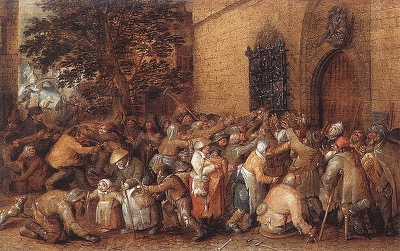
David Vinckboons: Distribution of Loaves to the Poor (first half of 17th century)
"I suspect that most of us could use some practice."
It might be a law of the universe that for every thanks given, one must be received, and while on Thanksgiving Day, one might sincerely offer many thanks, few ever mention the target receivers of these thanks. In this culture, most of us receive instruction in the practice of ThanksGiving, which seems a central tenet of human decency here, few receive much training in the congruent reception of those thanks. Was it Jesus who insisted that it's better to give than receive? We might have taken that directive a little too close to heart, for it's certainly not, then, damning to receive rather than to give, though many of us seem to respond to an act of giving as if it was somehow shameful to receive. We might blush and find ourselves suddenly tongue-tied, and simply nod as if to dismiss this backend of the ritual. A giver, appreciated for providing, might even catch himself mumbling, "It was nothing," thereby boogering up an otherwise uplifting exchange. But where to go to receive this essential training in ThanksReceiving?
This practice might belong to that class of practices one can only ever teach them self.
badream

Antonio de Pereda: The Knight's Dream (ca. 1650-1670)
On the banner: Aeterne pungit, cito volat et occidit.
"Eternally it stings, swiftly it flies and it kills."
" … not ever what they're not actually saying."
I dream in allegory, not coherent narrative. When The Muse asks what I dreamed, I'm speechless because I cannot translate them into words. They mostly seem absurd, haphazardly combining metaphors. I think of them as badreams (pronounced BAdreams) because they unsettle me and chase me away from sleep. Several times each week, I find myself awake, hesitant to close my eyes again, feeling not quite finished with sleep but effectively barred from reentering it. Each badream brings some message but these might just as well have been sealed within a bottle within a box and sunk deeply beneath the sea for all the coherence they seem to carry. They communicate anyway, beyond words, beyond any coherent in this world. Meanings seem to seep in and they often refuse to go away. Perhaps they carry significant information or maybe they're just distractions, synapses firing randomly to produce profound sensations signifying nothing. How could I know?
They often seem to carry warnings.
SecularHolidays

J.C Leyendecker: "Thanksgiving" [American Weekly cover art] (1940)
"SecularHolidays seem to be all about the food and remembering to say grace."
The founding American principle separating church and state might have quite naturally necessitated the creation and observance of not higher holy days, but secular ones. Visit Italy and you're likely to feel surprised when you find a bank closed on a Monday to observe some obscure, previously unknown to you, holy day of obligation. No worry about that happening here, except by rather accidental coincidence. Christmas, probably the pre-eminent SecularHoliday in the Ewww Ess of A, happens to share a day with several prominent sporting events and a rather mammon-rich exchange of what are referred to as gifts but often amount to payoffs, vigorish in a vigorous competition. On Ash Wednesday, Catholics can be spotted walking around wearing ashy crosses smeared on their foreheads, and that might turn a head or two, but on Halloween, otherwise respectable supermarket checkers show up for work decked out in the most outrageously ghoulish get-ups, and nobody turns a head. It's understood that it's a SecularHoliday, and everybody gets a pass.
Thanksgiving seems the most curious one, a SecularHoliday dedicated to gorging and recreating family trances.
PersonalResponsibility
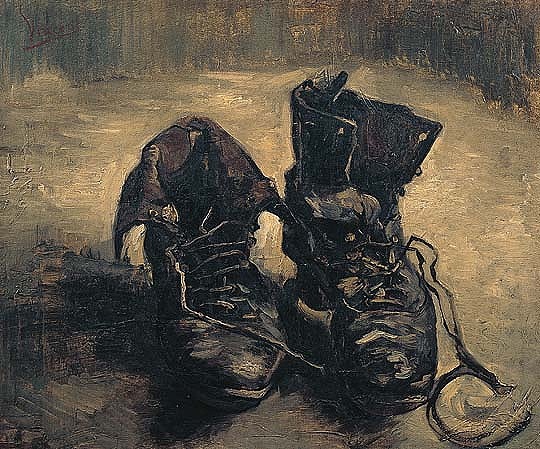
Vincent van Gogh: Pair of Shoes (1895)
"We'll be a very long time absorbing this lesson and recovering."
PersonalResponsibility will ultimately prove to have been the greatest failure during This Damned Pandemic. Governors, mayors, and other well-intended authority figures deflected pleas to take firm stands by directing The Public to wear masks, avoid clustering, and simply stay at home. Some insisted that it was these public figures' duty to mandate certain behaviors in order to stem the flood of infections. The more conservative responded by rejecting these assertions that their duty lay in implementing what they insisted were fundamentally unenforceable rules, insisting that individuals rightly held the PersonalResponsibility to, as they repeatedly said, "do the right thing," whatever that might become. As a result, several interpretations of right thing emerged, each presumed true by whomever held it. Some refused to mask themselves, for a variety of curious reasons, potential suffocation a common if utterly spurious explanation. Some even became militant at the suggestion that their PersonalResponsibility might extend any further than their own, apparently holy, me, me, and me. The result, of course, became a rather shameful and utterly ineffective act of Collective Irresponsibility, as each adhered to their own conscience rather than what might prove collectively effective. We produced together a large-scale Tragedy of the Commons, where what's individually perceived as best for me, inevitably becomes the very worst for everybody.
History might perceive this troubling paradox, and even a majority see it in real time, but unless everybody buys into mitigation, the outcome's inexorable, for stemming this infection was not merely a matter of PersonalResponsibility, but a collective one.
ThreateningToFester
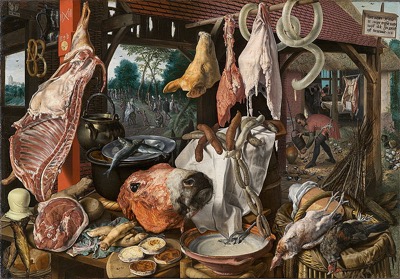
Pieter Aertsen: A Meat Stall with the Holy Family Giving Alms (1551)
" … something different will most certainly be ThreateningToFester in my curious larder."
I overstate my case, but only by a little, when I say that I use the same recipe for everything I make in the kitchen. I use a variety of ingredients, not the same ones again and again, but the ingredients for my best stuff share a common state in that they're all ThreateningToFester. I'm not above scraping off a bloom of non-intrusive mold, but most components haven't degraded quite that far yet, though they could easily pass over within the next couple of days. I maintain what I think of as a deep larder. It features plenty of variety and I refresh it more or less continuously. I preserve compulsively, always pressure canning something for later use. We tend to over-buy fresh veg and fruit. Mangoes tend to get away from us and need some surgery before using. Lettuces might turn a little brown, or even inky black around the edges before their turn comes up in rotation. I trim the worst, saving those trimmings in the freezer for a later stock pot, and all's right with our world again. Cilantro almost always manages to completely go to the dark side before I find it as an inky mess in the bottom of the Black Hole veg drawer, but that's an inconsequential loss.
My best suppers combine in some unexpected way leftovers from three or four previous suppers.
GroanUpAgain
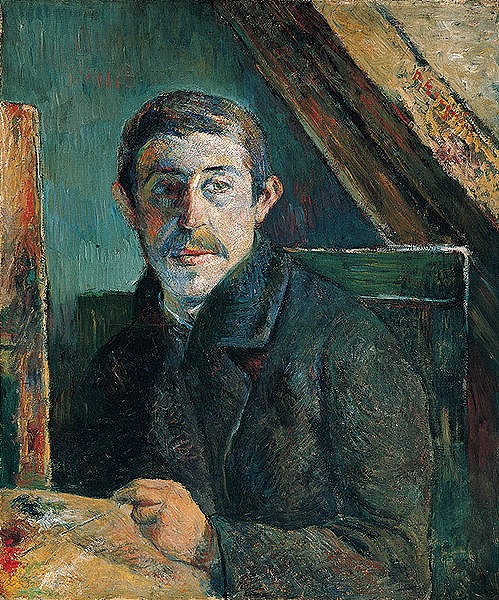
Paul Gauguin: Self-Portrait (1885)
"They left me behind to carry on something."
As near as I can tell from here, I'm still growing up. I doubt that I'll ever finish or even make all that much headway. It might have been youthful fancy that once convinced me that I might one day mature, and that it might prove to be a cure for what plagued me in my youth. I imagined that my native indecisiveness might one day grow into clear convictions, but that hasn't happened yet. I'd thought that experience might buy me a certain tranquility in the face of fierce uncertainty, but I'm still struggling with that koan. The very notion that evolution might apply to my own little micro-climate now seems absurd, for while I'm not precisely who I started out as, I'm remarkably unchanged after passing through this veil, perhaps myself now, only more so. Somehow, everyone else seems matured. My classmates became beyond middle age to more closely resemble their parents, I still feel exempted, except when my mirror lies to me, which it conspires to do daily. I know more but feel no smarter. I've many times been there and back again, but retain a similar curiosity as I held at the beginning, as if those excursions hadn't quite taken. Each morning seems new all over again, undiscovered like a familiar toy I'd lost then found, certain to lose again.
I accept just how ineptly I've overcome my challenges and yet I still managed to overcome them.
WillingSuspension
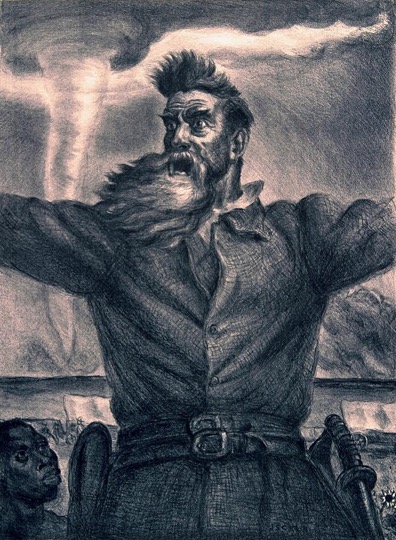
John Steuart Curry: John Brown (1939)
" … maybe we won't miss much of what we edit out for the purpose of improving the quality of our experience here."
The poet Samuel Taylor Coleridge is said to have coined the term WillingSuspension of Disbelief when trying (and probably failing) to explain how a reader should approach his work. Poetry's like a joke. If you have to explain it, it didn't work. I believe that he probably meant that The Rhyme of the Ancient Mariner should be read as a figurative rather than literal work; he didn't intend it to mean what it said but what it invoked. Most literature seems improved by reading with a fuzzy eye, not parsing it for too many facts, but perhaps for insights instead. Facts piled upon each other quickly become almost as interesting to read as a standard dictionary, plot line uninspiring. Theater, film, even television fail if perceived through any overly-critical eyes, for they rely upon a kind of conspiring with their audience, a tacit understanding that they won't mention the odd shadow the stage set casts or the obvious fact that no Martian would ever actually say THAT. We're pretending for some larger purpose, often, our own amusement. Of course the kids' improvisational after-dinner performance is lame. Parse for cuteness instead.
Following up on my yesterday's story, Disbelief, I spent my post-writing day considering Disbelief's accomplice, WillingSuspension.
DisBelieving
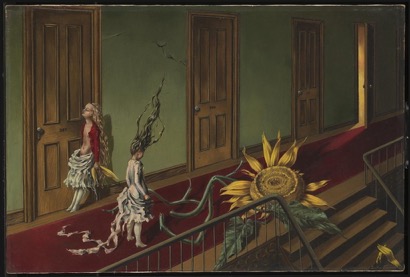
Dorothea Tanning: Eine Kleine Nachtmusik (1943)
I was never a believer in The War on Terror. Its premise seemed fatally flawed from the beginning. While it's true that in every war so far, neither side had the slightest idea what it was doing, The War On Terror lacked even a tangible identity for any enemy combatant. It was as it was conceived to be, a Whack A Mole® undertaking destined to string us along for an eternity or longer. The only possible way to win such a war entailed refusing to engage in it. Once deployed, no exit could possibly present itself, except to just withdraw from it, though such a retreat would necessarily bring into sharp relief the underlying fallacies behind it. We stay engaged to save face, I guess, further sullying our reputation for the purpose of preserving our self-esteem.
When I was a kid, I often wondered what it would have been like to live through a war.
AbSense

Caspar David Friedrich: Two Men Contemplating the Moon (Circa 1825-30)
"I'd graduated from and into my self …"
If absence makes the heart grow fonder, I must have the fondest heart. Much of my life (so far) has prominently featured absences, usually, my own. Making sense of these distances presents a challenge, since sense-making seems sort of a team sport. Solo sense-making lacks a requisite variety and tends to reverberate more than reveal. Most of my professional life, emphasis has been placed upon teaming, with little notice of its necessary individual component, where work's actually accomplished, in AbSense of everyone else. Few things seem sorrier than team members struggling to find their identity together, when each might have brought their own personally-crafted identity from home to hook up with each other's. That homework easily gets shirked in favor of some diversion, something (ANYTHING!) to pull the disquieting attention away from self. I remain uncertain what sort of training might prove useful for developing a deepening sense of that self, the one unavoidably separated from everyone else. Maybe training couldn't help. Perhaps it's just the kind of swimming that requires innocents falling in over their heads and then figuring it out by themselves.
Separated from the mothership at birth, the separations continued afterward.
ReNial
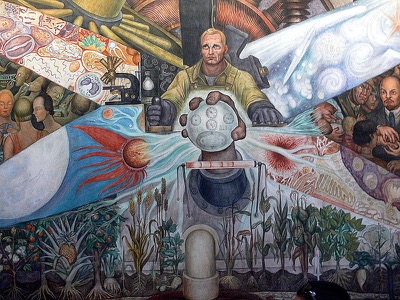
Diego Rivera: El Hombre in Cruce de Caminos (1934)
"What are we supposed to do with this?"
If denial remains the first stage of acceptance, ReNial attempts to infinitely extend irresolution. It's a cognitive state probably intended to keep the true believer safe, though it eventually backfires in practice to insist upon ever-increasing personal peril. When one falls into ReNial, no evidence qualifies as sufficient to counter any initial misconception. First impressions metastasize into permanent, ever more strongly defended, convictions. Those in ReNial seem to perceive admission of even a small mistake as an irreversible negation of self, a forfeiture of some essential part of their own identity. They persist in believing even obviously self-destructive falsehoods long after what most consider reasonable. They come to not simply resist acknowledging some obvious something, but eventually identify themselves as resistance itself. They thereby back into assuming a negative identity defined by what it denies. Negative identities tend to reliably produce the opposite of whatever they want.
Society long ago adopted forms of logic intended to help us prevent falling into ReNial.
Wreading

Berthe Morisot - Reading [La Lecture] (1888)
"Nobody needs to care where my writing comes from except for me."
Writers Wread much more than they write. We do not merely read, but Wread, which is the specialized kind of reading in which writers engage. We Wread compulsively, like we might breathe if on the edge of suffocation, a necessity much more than a choice. UnWread books sit like spare oxygen tanks on my side table. My piles of New Yorkers, emergency secret stashes should my books fail me. I won't read just anything, at least not to conclusion. I'm likely to try anything. I hold high but unexplainable standards for what constitutes Wreadable, and quickly discard anything striking me as incoherent. I'm particular because, like many writers, my writing seems to echo whatever I'm Wreading, echoes not being true reproductions, but similar resonances. I do not aspire to write like anyone else. Should I start Wreading something that does not sing to me, I dare not absorb its discordance, lest it leak back out in my writing and into my reader's ear.
I Wread for joy, to immerse myself in a writer's voice, to revel in clear and clever usage.
PandemicPete

This illustration appeared in 1909 in The New York American
"Go ahead, just shoot the messenger and try hard to avoid hitting your own left foot in the process …"
Nobody felt more wrongly accused than Mary Mallon, Immigrant Irish Cook for a wealthy New York banker's family vacationing in Oyster Bay. She felt fine and refused to cooperate with the investigator trying to track down the source of an unusual typhoid outbreak among the elite. Typhoid most often appeared in slums. Typhoid Mary was eventually quarantined for the rest of her life and felt wrongly persecuted for every minute of that time. Now infamous, we might imagine that Mary deserved her infamy, that she was particularly cavalier or callously cynical, but she was neither, just unaware, in the modern vernacular: merely clueless. SARS-CoV-2, The virus that causes COVID-19 infections, cannot be properly characterized as cavalier or cynical, either, neither can those who spread it unaware, a designation which might reasonably include anyone and everyone, since SARS-CoV-2 seems to primarily spread using Typhoid Mary's insidious method, via the asymptomatically infected. The Pandemic Petes exclusively responsible for spreading This Damned Pandemic might have each done what Mary did, unsuccessfully sue the health department for quarantining them, but might reasonably feel wrongly accused of what they do, what they each did in turn. They didn't know. I write this piece so that we might come to know together.
We have a long and overly proud tradition of shooting messengers, blaming informants for delivering unsettling content.
WhyIAmNotACapitalist
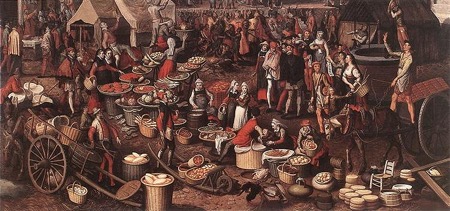
Pieter Aertsen: Market Scene (1550)
"It might be that only those unable to play gain anything."
I considered myself a non-combatant in the great twentieth century dichotomy between capitalism and communism. I chose Neither Of The Above, because I thought the distinction phony. This choice probably complicated my life. I was born into a self-proclaimed capitalist nation and I didn't profess fealty to the national religion. I wasn't so much opposed to others practicing it, within reasonable limits—nobody likes a glutton—, I just couldn't find traction for myself within it. Becoming a capitalist required that I accumulate some capital, or borrow some, in order to participate, and I never figured out how to satisfy this fundamental qualification. Some seemed to find employment that paid them more than they needed to live, but I never did, so capitalism held zero attraction. Capitalism always seemed like something other people did. Oh, I've purchased stock a couple of times in my life, but I always quickly disposed of it, feeling exposed as long as I held it. I'm more of a sock-drawer sort of investor.
I prefer to hold cash and advance myself by not spending it.
SelfEvidence
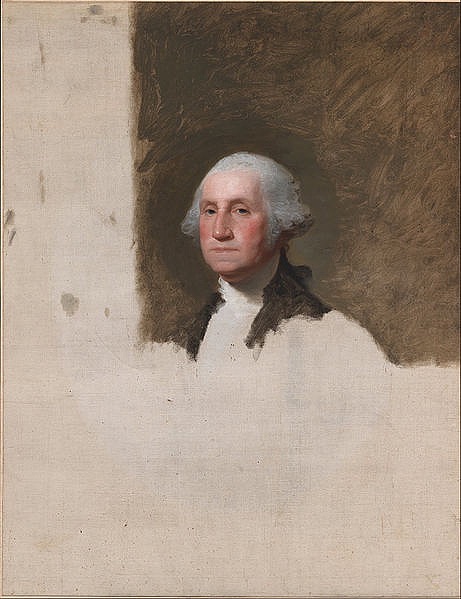
Gilbert Stuart: George Washington [The Athenaeum Portrait] (April 12, 1796)
"Maybe SelfEvidence inevitably insists upon regulation."
The Father of Our Country, George Washington, never fathered a child. I suppose that he was too busy fathering the country to get around to attending to his wife's procreation needs, or he might have been one of those futuristic types who could not quite justify contributing to eventual population explosion. The country he fathered was the only one predicated upon SelfEvidence. Also, his most recognizable portrait was never finished. These two facts might be related. The Declaration of Independence, a rather petulant document, insisted upon Self Evident Rights, ones requiring no independent evidence to prove their existence, a then unprecedented proposition. It left the infant country in a curious position, independent in unproven ways and decidedly headstrong, for it had created a conjured foundation, one lacking confirmation within the then-existing common law governing any nation. How might one go about translating this notion into practical governance, if mere propositions underpin the nation? This would prove to become the underlying question for the maturing country. It fueled truly terrible teen years which rent it in two, and a difficult early adulthood which went to its head. It encouraged diversity while endlessly punishing its presence. I think I can say without much fear of contradiction, that the nation, so constituted, became a skitzy mess.
I ascribe the resulting chaos to that founding principle of SelfEvidence, which encourages a certain Know It When I See It sense, which often manages to make little sense at all to someone else.
TroubleBubbles

Jean-Michel Basquiat: Flexible (1984)
"Oh, the stories they'll tell later!"
My friend Franklin's son Bodie is a freshman in high school this plague year. Bodie's a smart kid, so I'm convinced he'll experience only the normal academic encumbrances, but I wonder how he'll manage to become an adult without the freedom to experience adolescence's usual and necessary dalliances. Playing hooky's probably out of the question. How will he be able to develop even a half-decent addiction to anything he'll later have to recover from if he's not out and about unrestricted by lockdowns? Will he even have access to the usual reprobates every kid tries to relate to for a time? How will he disappoint his mother if he's just home in bed every blessed night after supper? Will Franklin have to serve as his sole bad influence? I believe that nobody gets to become an adult without making more than a scant few serious mistakes, some potentially life-threatening. Teens live intensely and learn rather begrudgingly before building their lives on top of the catastrophe they construct for themselves. How can they accomplish this critical work if they're home with their family each night?
Dates seem impossible while every possible venue's in lockdown.
Airgknowrance

Mr. Toad, Illustration by E.H. Shepard from The Wind in the Willows by Kenneth Grahame (1908)
" … every action seems somehow destined to produce some greater wisdom if we can only pay attention."
Have you noticed how arrogance always seems to accompany ignorance? The most insistent seem to turn out to be the most consistently wrong. The soft-spoken, ain't jokin', while bluster seems to be trying to muster more acceptance as if it could not possibly stand on its own. It almost never can, and the bluster rarely helps longer term. A tangible humility accompanies most truth, for it seems to have nothing further to prove. It walks both softly and without carrying around any over-sized stick. In spite of this fact, some always seem to attempt to successfully argue at annoying volume, perhaps compensating for an absence of veracity with distracting noise, as if few would notice the naked emperor before them. Besides rendering themselves annoying, they quickly become boring and eminently ignorable, just so much irrelevant static. They can, however, attract teeming legions of the ignorant, people perfectly willing to, for instance, take up arms to defend utterly fictional rights and privileges. These people seem genuinely dangerous.
Napoleon noticed that if he gave any decent man a red banner and a uniform, he would quickly become a soldier, and willingly die for abstract concepts like God or country, liberty or fraternity, without ever asking for supporting definitions.
SnowDaying

Adriaen Brouwer: Youth Making a Face (c1632/1635)
" … holding me closer than I care to be held."
The cats remain small children, approaching eight or nine human years old, only a year and a half in cat years. They remain the centers of their worlds with whole universes existing solely to service their whims. They haven't yet heard about manners. Max wants outside when he wants to go outside, and denying his demand leaves him mournfully yowling. It's cold outside this morning, though, and he has not yet learned to respect the cold. I suspect that he imagines his late summer predawn awaiting him. He looks as if I've betrayed him when the door opens to snowing. He steps out as if into water, slinking off into shadows. He quickly returns, complaining as he enters, seemingly pleading for me to restore regular order. Molly seems more mature in that she might no more than step out into it before appreciatively returning inside, resigned. Neither seem to want to be inside through the morning. They take to their corners to dream, I suspect, of the mice they expected to be hunting. This day will continue forever.
Nothing like weather to spark the unrequitable urge to go somewhere, anywhere.
FiguringOut

Edvard Munch: Dance Of Life (1899 - 1900)
"May I never finally figure it out."
I write because I'm still FiguringOut how to write. I cannot remember the elementary school lesson that disclosed this apparently fundamental aspect of living, that one might learn without ever finally resolving learning, the tenaciously asymptotic aspect of life. I can't remember that lesson because I never received it. Each learning iteration might well advance the cause without resolving the struggle. Another deficit always emerges to render the learning incomplete. It might be that mastery emerges only after this understanding overtakes more naive notions, when the trajectory finally becomes clear. Nobody ever actually arrives there, though the pursuit remains worth engaging, just as one remains worthy of engaging by continuing. The purpose of FiguringOut must not be to finally figure out, for FiguringOut only exists in irresolution. Should anyone finally figure out anything, they should properly cease further learning. Then what? Become some font of knowing, a cold stone artifact of known? The world seems to continue changing, indifferent to such presumed achievements.
Maybe simple entropy explains this feature, where each advancement furthers without resolving.
InFLUencing
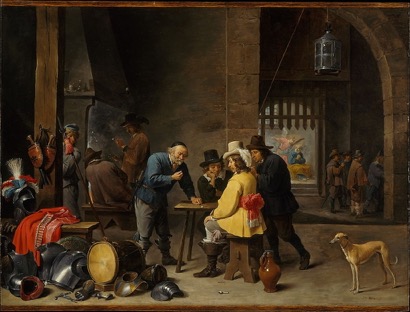
David Teniers the Younger: Guardroom with the Deliverance of Saint Peter (ca. 1645–47)
"Why would I chose to live any other way?"
The Lord reportedly works in mysterious ways, but no more mysteriously than any of the rest of us. I, for instance, rarely sense that I might be inFLUencing anyone, though I suspect that my inFLUence extends much further than I comprehend. It might be that every action, every thought, spreads virally, or virus-like, which is to say insidiously and invisibly. My casual aside might arrive like a missing puzzle piece for some anonymous anyone barely within ear shot, utterly unbeknownst to me. I feel nothing when another receives something I've sent unawares. They feel nothing when they've inFluenced me. We play a Blind Man's Bluff without deliberately bluffing, for this seems to be the stuff of human interaction. We're each incapable of inaction, for we seem to be continually InFLUencing whatever we do, even we firmly believe that we're doing nothing at all.
Know that whenever you show up and however you appear, you're actually InFLUencing there.
Grudgy

Jan van Noordt: Juno confiding Io to Argus (circa 1660-1670
"The Grudgy seem dedicated to continually unflushing toilets, a service nobody really wants or needs."
Grudgy lies near the top of the heap of the more unseemly human responses. Sore losers seem most like losers to their core, boring drinking buddies, and terrible neighbors. They cannot seem to do anything but remember that sleight, that indignity, that otherwise minor loss more properly relegated to humbling forgetfulness. It becomes their oeuvre instead, their sole identifying trait. They're the ones who never forgate and forevermore shoved their sorriest episode before them to announce their presence. Most wisely slip aside to hide until they pass by. The few friends they end up with feed like carrion birds on this sorry story they've heard so many times, in all its many variations, that they could recite it backwards. They seem to need an opponent, someone eternally out to get them, to feel complete. They shamelessly bleat.
I'm not above the occasional dabble in pouting.
Can'ticipation

Francisco Goya: (Átropos/Las Parcas), Atropos (The Fates), 1819–1823
"A Can'ticipated catastrophe seems somewhat averted."
Election night brought a waking nightmare, a scare effectively warding off sleep and leaving a rare but familiar sense of foreboding, as if The Fates had found me and were in the process of stealing any remaining self-determination still available to me. I might have set myself up, knowing that I'd optimistically entered the election, what any pessimist would agree might certainly poison any expectation. I watched myself cycle through the three stages of despair: Want To, Need To, But Can't, a condition I might label Can'ticipation. The resulting sense of desperation seems absolutely inescapable, and tends to arrive at what certainly feels like the most inconvenient possible time. I felt utterly unprepared for a fresh round of coping and felt that I even deserved some sort of reward, or at least some recognition, for my the hopefulness and dedication I'd exhibited through an overlong campaign season during The Damned Pandemic. I felt very near the end of anybody's rope and could not afford to imagine that I might have to muster even greater coping skills than I could remember ever mustering before. I spent that long night terrified of the apparently inevitable.
I swore off all news coverage, not wanting to know what I already so deeply felt.
Domesticity
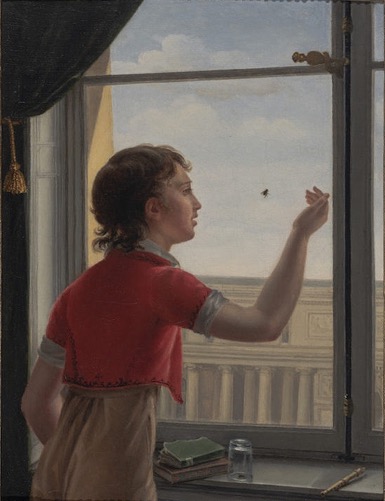
Isabelle Pinson: The Fly Catcher (1808)
"We're learning that Molly's actually in charge …"
Molly The Kitten arrived here a year ago, just over six months old, after we'd successfully shanghaied her from the cat shelter. I had taken responsibility for interviewing her to determine suitability. We knew she was Max's sister, and we would have taken her when we'd nabbed Max a few weeks before, except she was still recovering from several diseases common to ferals, so we'd decided to wait until she'd recovered. They'd given her the humiliating name Parfait, I suppose because her coat features swirls of contrasting color. She was not then anybody's cuddly sort of kitty. She cowered in the corner of her cage and flew into a shredding rage when I tried to scratch her head. I finally managed to pick her up and sort of sit her on my lap by wrapping her in a towel, fresh gouges weeping blood from my offending hand. She glowered in the absolute antithesis of appreciation. She seemed like she might eventually tame just fine, though that sense might have been my arrogance talking. She came home with us and began what would become a year-long keep away game. She's still only somewhat tame.
In the last week, she's finally consenting to allowing me to touch her without me first bribing her with treats.
Liedentity
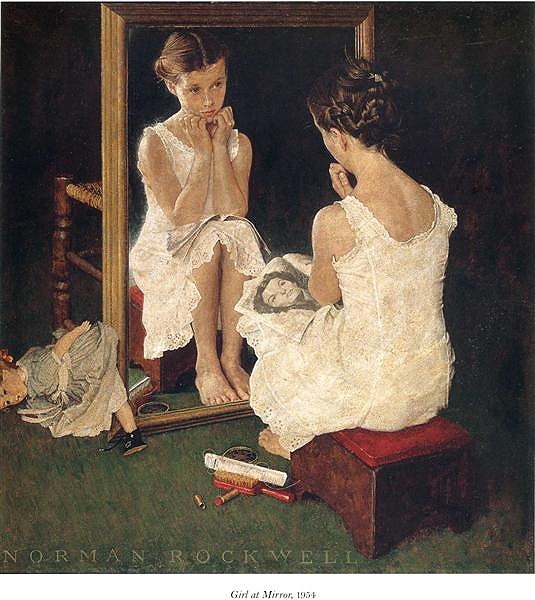
Norman Rockwell: Girl at Mirror (1954)
"If you really want to know my identity, just get in line behind me."
Excuse me, please, for even bringing up this topic, but I seem to be experiencing an identity crisis. I, perhaps naively, believed that my identity was mine, a deeply personal characteristic I shared with nobody else. It might seem similar to others' without mapping one to one, a one-of-a-kind. I'm coming to recognize that discovering my underlying identity might serve as a pillar of personal enlightenment. Describing it might prove impossible but attempting to describe it might prove a useful medium for actual self expression, and a necessary one. I might achieve nothing more than rough approximations of descriptions and still satisfy myself, even others, that I was coming to really know myself: who I was, who I am. But recently, identity seems to have turned into something else, a perspective almost exclusively turned away from self and toward somebody else. Identify might have become the replacement meaning of identity, where I exclusively seek myself in somebody else.
Identity Politics seems founded upon the principle that self belongs to collective associations, that the source of identity just might reside within relations with others.
TimeBubbles

Jacob Lawrence, Street to Mbari (1964)
" …by then it will have become irreparably past."
Einstein concluded that time moved inexorably forward, never backward, though its substance eluded him. Unlike other elements of his physics, time stood off to one side, never discretely discernible, but also essential. His calculations couldn't work without its shadowy presence. Clocks from sundials to mechanicals seem to materially misrepresent time's nature, for while it doubtless does only move forward, it does so less regularly than popularly represented. It seems to move in fits and starts, seemingly sticking some places for periods ranging from hours to decades. The basic unit of measure for the human experience of time's passing might be labeled The Period, in homage to both its tenacious indeterminacy and also for its inevitable termanancy. Periods last for 'a while,' and tend to end with often shocking banality. Once they're over, they're over forever.
I think of time as existing in TimeBubbles.
MillionDollarDream

François Boucher: Sleeping Shepherd (Circa 1750)
"Whether that dream ever attracts a million bucks could never have been the point …"
Though a million bucks certainly ain't what it used to be, it remains a considerable chunk of change, and while I've never possessed that magnitude of personal wealth, I have been the beneficiary of several MillionDollarDreams. The absolute magic of a MillionDollarDream seems to be that it need not produce a million actual dollars to manifest its true purpose. Some who pursue their MillionDollarDreams do, indeed, attract significant financial gain, but even those whose pursuits never realize financial profit, still benefit enormously from their engagement, for a MillionDollarDream seems to impart a kind of gold plating to whomever maintains them. Each MillionDollarDream starts as a rather wild idea, one with perhaps no obvious chance of ever coming to any sort of actual fruition, like the notion that you and a few friends might, in a scant week's time, transform a dusty old barn into a successful summer stock theater and produce a hit show capable of launching everyone involved into stardom. The resulting flurry of activity might be best characterized as absolute parody, but for those involved, it likely becomes a peak life experience worth at least a million bucks. That's a MillionDollarDream!
My MillionDollarDreams were each capable of goading me into investing a million dollars into them, though I at no time ever held that kind of line of credit.
Voicing

Leopoldo Metlicovitz, poster for Puccini’s Gianni Schicchi (1919)
"It might be that every authentic Voice sounds phony to itself …"
The first time I heard a recording of my voice, I felt embarrassed. I feared that the abomination I'd just heard had been a faithful reproduction of the tone and timbre everyone had always heard emanating from my pie hole. I felt appalled that I might have, completely unbeknownst to me, always sounded like … like … like THAT! And so I received my first great injection of self-consciousness, a virus, I suspect, and one from which I might never recover. From there emerged an inhibiting shyness on stages I formerly simply possessed. I could not hear that queerness when speaking or singing to myself, for some acoustical quirk spoiled fidelity, though my Voice sounded much better to me than that recording had sounded. I took to practicing in tightly enclosed spaces, bathrooms and closets, in hopes of better hearing how I actually sounded. I never lost that unwelcome awareness that I had never known how others heard my Voice.
I don't sing so much anymore.
PeopleWatching

Crispijn de Passe the Elder: Noah leaving the ark with his family and animals: at left Noah's family carries supplies, at right animals descend on a ramp from the ark, above birds fly from the ark, from a series of engravings for the 'Liber Genesis' (1612)
" … even if your quarter horse provides none of the entertainment."
I've always been a sucker for a parade. Few anticipations excite me more than the one that comes when I'm on my way to watch a parade, even when I know for certain that most of the 'units' will be lame. I love waving at people floating by in spotless mid-century convertibles and I'm stirred by every marching band. When we lived in Takoma Park, Maryland, which sponsors a Cracker Jack 4th of July parade, theirs included a yoga drill team which would march for half a block, then stop to perform poses. The 911 Truthers always fielded a provocative float, and one year, neighborhood dads organized a Grill Team, which performed synchronized marching while pushing gas grills in front of them. The best of the best have always been the happened-upon ones, like that year we came up from a Manhattan Flatiron neighborhood subway station to find ourselves experiencing the annual gay pride parade cruising by, with Cyndi Lauper on the back of some fire station's flatbed float belting out Girls Just Wanna Have Fun, surrounded by dancing shirtless hunky firefighters wearing spangly hot pants and bright red fireman helmets. That experience could change anyone's life!
Covid Shutdowns limit the opportunities for attending parades, but the real attraction of them was always the PeopleWatching opportunities they afforded.
Psycholitics
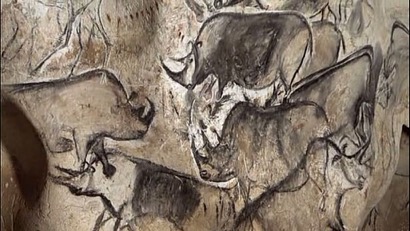
An artistic depiction of a group of rhinos in the Chauvet Cave (30,000 to 32,000 years ago)
"We are much older and more experienced than Our Founding Fathers ever became."
The United States is not the only sovereign nation where serious psychological problems have been codified into the law of the land. However brilliant and breath-taking Our Revered Founding Fathers' work might have been, it also served as psychological self-portraiture, partly aspiration and partly indictable by modern standards. It codified prejudices intolerable in our more enlightened times, just as our entitlements will over time inexorably seem insufferable conceits to those we leave behind us. For instance, our treasured Second Amendment, as presently interpreted, encourages self-destructive reactions to paranoid delusions, so people buy guns to protect themselves from people who buy guns, which further encourages people to more buy guns to protect themselves from people who more buy guns. It's become a recursively runaway psychological social disorder guaranteed by our Constitution: Psycholitics. Each successive generation is more experienced than its predecessor. All carping aside about society's evolutionary entropy, there's ample observable evidence that we're, as a people, actually maturing over time; better coping. Behaviors accepted as representing righteousness have over time become intolerable evidence of racism, classism, misogyny, grand larceny, and murder in the first degree. Conservatives seem determined to preserve some sorry legacies in the interest of decency, a calculation that understandably drives progressives crazy. Of course, contravening historical precedent drives the originalists insane. The result seems to be a Body Psycholitic, a society undergoing particularly difficult ongoing therapy with the goal of ultimately getting over itself. It's also a fairly accurate portrait of Hell, an under-appreciated price of self-governance.
Psychologist and counsellor Eugene Kennedy suggested, "The things about me that drive you crazy are the things that keep me sane."
Scholarshit
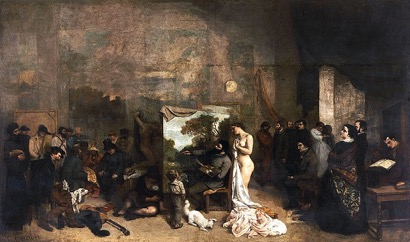
Gustave Courbet: The Painter's Studio: A real allegory summing up seven years of my artistic and moral life (L'Atelier du peintre) (1855)
" … just a form of confirmation I was then too naive to accept."
No amount of even the most diligent study would have ever turned me into an astronaut, a result which blesses more than curses us all. From my now lofty perspective, poised as I now am upon the tail end of my existence here, it's becoming ever clearer to me that there might have been some curious pre-destiny involved in determining who and what I would become, that it was never, even for a moment, an open book or a matter of studious diligence. The writing might have seemed much clearer had I understood how very near I had always been to whatever I might become. I was apparently never destined to become President, even though that possibility was early on promised me as a birthright American baby, where anyone might become whatever they muster the will to imagine themselves becoming. I knew early on that I would never become one of those gas station mechanics with an embroidered Dave on my shirtfront, or a cop, or an electrical engineer. It was never nearly as clear who I might become as it was who I never would end up being.
My studies, such as they were, disclosed whispers. I knew what could hold my attention and what induced a coma, though my teachers ascribed a lack of dedication to my more obvious shortcomings, as if an additional ounce or two of diligence might make a real difference.
SecondOrderFatigue

The Tired Dancer: John Reinhard Weguelin (1879)
"I live right up close to that edge."
I've been dog tired before, and bone weary, and sick and tired plenty of times, but I confess to feeling even more exhausted this time. I've put my time in on the factory line, twelve endless hours performing the most mindlessly repetitive motions, but that was nothing in comparison to this subtle sickening feeling. This endless evening in isolation might do the infamous Chinese Water Torture proud for how it cows and humiliates me. Born into a land firmly believing itself to be both proud and free, we're forcibly humbled before an utterly invisible enemy which steadfastly refuses to show itself. Many have already come to believe that this was always an imaginary foe, and every countermeasure an humiliating over-reaction, like fleeing from shadows vaguely flickering on our cave's moist wall. Before each fall came a clear call insisting all was well after all, that we had little to fear beyond an evidently irrational foreboding, and we set to no longer flee from that. Once contracted, there would be no fleeing backwards, back into the SecondOrderFatigue which so convincingly misleads each to presume an invulnerability never evident beforehand. Once infected, we'd experience fatigue for a wholly different reason.
I try each day to reinforce what I fancy to be my protective reasoning, for, like Robinson Crusoe's Man Friday, I feel as though I've been stranded three years, alone on some desert island and subsisting on goats.
Re-Ality

Willem van Haecht: Collection of Cornelis de Geest with Paracelsus (1630s)
" … the real one this time."
I find myself exhausted by the seemingly endless arrays of alternate realities offered to me each day. My choices overwhelm me. Which reality should I engage with today? The one just outside my window might have once been sufficient, but the many within just our modest Villa seem to dwarf and upstage it. Skimming my many books, each presenting a different perspective, could consume several lifetimes. TV, radio, podcasts, and things Internet each present slightly different representations of Re-Ality, each a little different, each somehow also the same. They each seem to try to characterize a separate reality in various degrees of believability. I consider my reality palate somewhat refined. I won't agree to swallow just anything. Sci-Fi, for instance, never qualified as either believable or entertaining to me. Reality TV seems far removed from any form of reality I've ever even imagined. I was blissfully unaware that such a character as a bachelorette even existed, for instance, until I was subjected to such a presence on a so-called reality TV show. But what do I know?
I once believed myself to be my own arbiter of reality, as if I got to choose which version I subscribed to, but I fear that I've somehow lost that ability, surrounded as I seem to be with so many perspectives seemingly far superior to my own.
Schmaltzing

George Frederic Watts: Hope (1885)
"My first and most prominent occupation has always been Schmaltzing."
When I look down from near the top of my family tree, I see the antecedents of what would one day result in me. Though they hardly lived in the manner to which I've grown accustomed, I imagine that their existences somehow informed mine, though I knew only the barest few of them and even those barely spoke of such things. My father's side of the operation seemed the most convoluted and diverse. The Muse managed to trace my father's mother's family clear back to Roman times in Gaul, where the patriarch was a Prefect, and his progeny became the crowned heads of Europe. My later line ultimately sprang from some later-born princess. My paternal grandfather's heritage seems much less diverse, simple Alsatian farmers, perhaps Jews coerced into Catholicism displaced by centuries of unrest, a sort of diaspora unto itself. From them, I inherited my Schmaltziness, a certain endearing cloying sentimentality I consider my primary defining characteristic. Though I know I'm genetically half my mother's Scotch/Irish heritage, I consider my Schmaltzing my emotional center, my underlying superpower.
It might be socially incorrect to consider genetics germane to anything, a form of phrenology about as defining as bumps on a head, a superstitious sort of social racism born of misbegotten understandings, and it might have been an accident that I was born with a surname that so accurately represents what I've always felt.
ForkAssed

Pietro della Vecchia: A fortune-teller reading the palm of a soldier (circa 1626-1678)
"I fear that I'm way too dependent upon what my forebears just adapted to in moments of sometimes overwhelming extremis."
According to the weather ForkAssed five nights ago, we would be experiencing much colder weather and snow this morning, so I spent the following five days anticipating its arrival, certain of my near future. This certainty encouraged me to thoroughly prepare, to tear down the summer garden, drain the hoses, stack the pots, and rake up the fallen pine needles. The Muse and I put away stores that might have serviced Admiral Perry's Antarctic Expedition. I switched out the screen door for the solid glass one. I spent yesterday's late afternoon swishing a broom over the front porch before just sitting there because I knew for certain I'd be sitting inside for the foreseeable future. Even the cats seemed to sense an impending end to just slipping up the hill to stalk field mice. Neither of them seemed to really want to come in, not even to extraordinary enticements. I empathized with their sentiments.
Once in, with the fireplace throwing heat, it's impossible to beat the cozy snowed-in feeling.
Badministration

The Cube Farm
"An ounce of appreciation seemed to power the whole operation."
My first job out of business school found me supervising the Automatic Bank Check Unit of the Individual Insurance Administration Department of what I came to call The Best Of All Possible Mutual Life Insurance Companies In The Greater Portland Metropolitan Area, Bar None. It was the only mutual life insurance company in that area, but it still provided a truly terrific medium for learning about administration, the actual lifeblood of every organization. We learn to think of Business and Industry, even Government, as producing products and services, and they certainly do that, but each expends more effort administering that production, accounting for every damned thing, billing and collecting, and litigating disagreements. Whatever product a corporation claims to create, it's expending the bulk of its energies administering, administrating. The first rule of administration says, "Thou shalt remain steadfastly invisible," for prominence essentially renders administration useless. If every back office ministration means another runaround, it won't matter that you're selling the secret to eternal life, quickly, nobody will feel terribly moved to buy any. The key to effective administration has always been invisibility.
We speak today of 'seamless' transactions, the latest manifestation of a trend evident since people bartered with stones.
Cyclings

Laufrad des Freiherrn von Drais: "Draisine" or Dandy Horse, 1817 design
" … not the disrupters they first appear to be, but the unlikely connecters between what is and what might be …"
Each week seems to follow a similar pattern, enough the same as to encourage a sense of familiarity without necessarily reducing to completely numbing sameness; each different while also quite the same. For me, each week delivers some unanticipated failure which I so far seem to have always managed to overcome, as if each week had been served up to remind me that even I'm capable of recovery. This week, my blog server stopped serving me and the Customer Support Team suddenly stopped invisibly supporting me to become the obvious source of an apparently intractable difficulty. At first, as usual, I had no obvious alternative to continue delivering my accustomed daily production, and the seduction to simply crumble washed up and over me. Eventually, by which I mean by no means immediately, I came to understand that alternatives might surround me, and I set about choosing a viable one. By no means did this transfer occur smoothly, for I seemed to need to work my way back through the usual universal stages of acceptance. I experienced in succession: fear, anger, discouragement, reckoning, and then an only partially acceptable sort of acceptance. I experienced an amputation then came to acknowledge that the initially begrudged peg-leg replacement might suffice for now. I retain a sense of loss along with a lessening urgency to return to the way it was. I suspect that the longer this work-around extends, the more it will become what I'd always unknowingly intended what it replaced to become.
I make no shocking pronouncement when I insist that things do not work as advertised.
Undoing

Thomas Degeorge: Death of Archimedes (1815)
" … even eternity seems an endlessly moving target."
The sure and certain sign of Fall's victory over the Summer season comes when I finally accept that it's time to disassemble the deck garden. Lovingly created over a long June weekend, it can only last so long before every pot and planter will need emptying or risk shattering in the impending cold. Shelves return to the master bedroom to hold part of The Muse's extensive African Violet collection, their usual over-winter occupation. Lingering petunias pulled and packaged as garbage. Dahlia bulbs recovered for storage in a paper bag with peat until next Spring. Everything's got to go. Snow's predicted a few days from now and so it seems a great Undoing's required, though undoing implies more of a cycle than the effort actually entails. There will be no resurrection of either these plants or this garden, for next year, next Spring, we'll be cultivating different soil in a different place, so I do not need to carefully preserve the potting soil for reuse next year. We will not pack and ship the soil along with us, so I refresh the beleaguered flower beds with it. The yard looks fresh and ready for more than the six month snow bank soon to overtake it.
Hope always springs for me each autumn that there might actually be an Undoing, though there's only even a moving on involved.
RespectableAgain

Franz Marc: Träumendes Pferd [Dreaming Horse] (1913)
" … as decency becomes RespectableAgain, finally!"
I decided early this morning to afford myself a little hopeful anticipation. With two weeks remaining before this election, it seems increasingly likely that decency will shortly become RespectableAgain. Through the current occupation, the man elected to perform the role of leader of the free world seemed incapable of showing respect toward anyone, including himself, and like any member in good standing of what my folks used to refer to as "the bad crowd," he encouraged a general debasement of the traditional rules of comportment. He seemed to work awfully hard to turn everything upside down and backwards, and only because he believed he could, and many—way too many—seemed to follow his lead just as if he was seducing freshmen into a previously inaccessible underworld. He tried to teach them to drink and smoke and avoid curfew violations, just as if not getting caught amounted to genuine freedom. A few seemed to flip entirely to the dark side. Others dabbled, but could not shake their inherited decency, their own unshakable paranoia sending them back into their families. Most of us looked on feeling horrified.
So this sense that some big changes are coming feels enormously reassuring.
EncroachingParadoxes

Ludwig Passini: Roman Fish Market at Sant'Angelo in Pescheria (1863)
"EncroachingParadoxes: experiences that make absolutely no sense at first …"
Beyond the senses, we each possess layers of additional sense-like resources such as reasoning, emoting, intuiting, and others. We employ these additional "senses" to make sense of experience, though this label might misrepresent our sense-making efforts. We probably over-rely upon reasoning as the ultimate gold standard method for sense-making, though reason, innocently applied, can't always produce understanding. Even scientists claim to rely upon sixth-sensing to noodle their way into and back out of complicated analysis. Pure reason, if it exists, might not reliably produce the most believable results. Rejecting reasoning probably makes analysis worse, so we seem stuck with paradoxes whichever methods we might choose. Intuiting lacks replicable rigor and emoting seems too mercurial, though both can add insight to an inquiry.
It might be that each technique cannot avoid the critique that it lacks some essential something.
HumanNature

Franz Marc: Tierschicksale [Fate of the Animals] (1913)
"When it's already too late to learn better, we might finally start personally relating our own innate HumanNature …"
When The Plague hit Florence in the 1340s, people reacted similarly to how we've reacted to This Damned Pandemic today. I've long questioned just what it might mean to know something, for knowledge does not tightly correlate with behavior. Knowing something doesn't necessarily change anything I do. I suspect that this reaction stems from what I might characterize as an abiding Personal Sense Of Exemption, that even what I know for certain seems more likely to apply to others, but not directly to me. Speed limits seem to reinforce this proposition, since even when it seems clearly in everyone's benefit to obey them, a herd-like mentality seems to override caution, and almost everyone exceeds the limit, perhaps sensing that everyone else is getting away with something and that they don't want to feel cheated, especially that they might be cheating themselves. Personal imperiling to avoid feeling cheated might be HumanNature incarnate. We might just as well have dinner in that restaurant. Everyone else seems to be going and we wouldn't want to feel left out.
Describing HumanNature seems eerily similar to relying upon a fish to explain water, a fish so intrinsically immersed within the stuff that it might prove utterly invisible to any fishy observer.
StumpTheChecker

Franz Marc: Fuchse [Foxes], (1913)
"The odd, the British insist, are nearer to God."
Our Saturday larder-stocking excursions have continued in greater earnest since the Damned Pandemic lockdown orders kicked in. These represent the sole opportunity for The Muse to get out into the world, and though we cannot properly call these shopping trips, they provide some sense of possibility beyond talking to a basement wall, her usual occupation through the week. I usually make a couple of trips out to pick up odds and ends, but always alone and inevitably mission-focused, hardly recreational. The Saturday outings serve as our sole socialization, so we've continued them, albeit under extreme caution: Masks, a handy bottle of hand sanitizer, little lingering or investigating involved. We're pretty much in and back out again, following our Stations Of The Cross sequence from butcher to green grocer to supermarket to liquor store to fish monger, then home. Even this small variety in the numbing sameness can approach boring, so we've adopted a few diverting amusements which we incorporate into these days. We might listen to the latest Radio Deluxe podcast between stops because The American Songbook's always a welcome companion. We continue our infinite Slugbug competition, which seems friendly to a point nearing absurdity. We humbly genuflect when in the presence of Parking Karma, when The Gods provide a parking place nearest a store's front door. We most enjoy our ongoing game of Stump The Checker, though.
For those not already engaging in this competition, it's another one of those so-called friendly competitions where gaining actual points is never the point.
SchlockWare
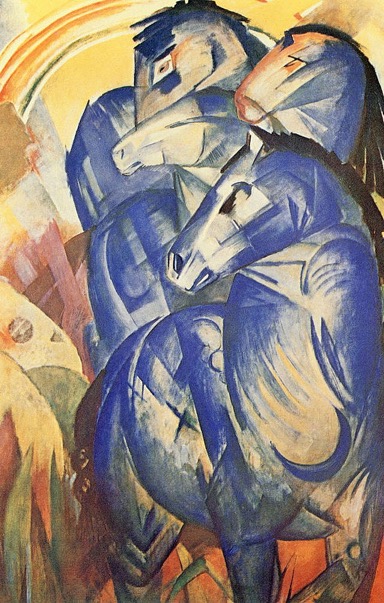
Franz Marc: The Tower of Blue Horses (1913, missing since 1945)
"Our virtual existence seems remarkably similar to our actual one."
Our Damned Pandemic has driven those of us not formerly living virtual lives into ever deeper virtuality, a rough mock-up analogue of what previously passed for reality. I meet weekly with a group of friends, few of which I've met face-to-face, employing Zoom, currently the most popular interface. I convene the gathering, but understand only the barest trace of how to operate it. I hunt and peck and generally succeed, learning a little more about it each week. I will never flawlessly invoke the screen share feature, probably because it was not designed for seamless invocation. I apologize in advance, then clumsily manage to share my screen after a couple of stumbles in between. We're all forgiving, for none of us have mastered the application, just like every piece of SchlockWare we've grown to rely upon. Not even superuser status would protect us from collectively stumbling when employing it, for I doubt that even its designers have fully mastered it, in the unlikely event that designers were even involved creating it.
Each 'app' seems to have outgrown its founding charter, intended for one purpose then serially upgraded to cover functions never imagined in its initial instantiation.
Bettering

Franz Marc: Blue Horse I, 1911
"Onward, not necessarily always upward!"
I understand that I'm supposed to be Bettering myself, but I struggle with sustaining even the barest semblance of my current status quo. It's not that I'm not Absolutely Dedicated To Achieving Excellence, it's more that I sense that I might just have already managed to mostly achieve good enough—if not for government work, then perhaps for mine. I've been told of the necessity for continuous improvement but doubt the proposition that every damned instance begs for Bettering. Could good enough never be … good enough? I understand that I could be better than I are, swinging on some star and all that, but the consequent paranoia seems a poor reward. If I'm not endlessly Bettering, will I never get no satisfaction? And if I am endlessly Bettering, does that not strongly suggest that I'm not yet worthy of achieving any satisfying anything? Where's the satisfaction in that endless Bettering? Continuous Bettering seems roughly equivalent to simply giving up, acquiescing to endless short-comings, never really done. How fun does that sound?
We say that we're a striving society, but we seem more of an exhausted one, or, maybe, simply fed up.
Openness
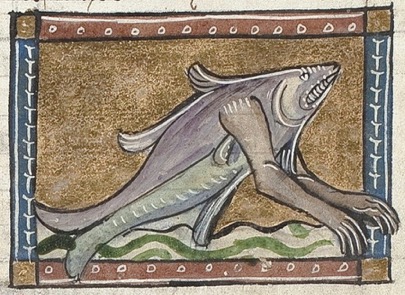
Illustration taken from the illuminated manuscript Der Naturen Bloeme: The Flower of Nature produced in Utrecht or Flanders (ca. 1350)
"I wish that Computer Scientists understood what computers were for."
There's probably nothing wrong with computing that fewer computer scientists couldn't help. An insurgency favoring Openness has grumbled within that field since its inception, with few signs of its imminent success. Propriety has ruled instead, with OpenSource taking its place as just another proprietary platform as far as most users are concerned. Earlier, the Macs battled the PCs without a conclusive decision. I sided with the Macs, though by making that decision, I'd chosen to have to translate everything I created into Klingon if I expected anyone without access to my more open (to me) propriety, and that I would have to translate from Klingon anything they sent to me. Yesterday, a friend sent me a file formatted as a .odt file, pure Klingon to me, unreadable in a whole new way. It came complete with imbedded HTML in the unlikely event that I felt like reading between the lines of code to unwrap the cryptic message within. So much for Openness.
I figure that Openness always qualified as a Utopian aspiration, anyway, for nothing in the natural world seems all that wide open to me or to anybody.
MediaDerangementSyndrome
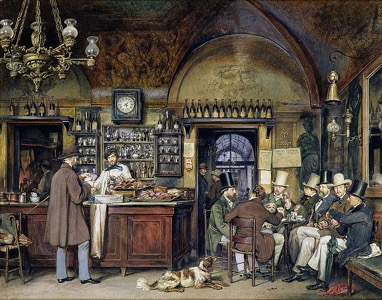
Ludwig Passini: Artist in Caffè Greco in Rome (1856)
"Sometimes I amaze myself, usually when I'm in the middle of debasing myself again."
I imagine that Cafe Society served as the social media of its time. Gentlemen would congregate around a table to share gossip and show off for each other. Women preferred tea. There were certain rules of comportment, depending upon the participants' social class. The more lowly barroom observed different customs than might a cafe, though each served similar purposes. We're social animals and we seem to need to bump shoulders if not heads to maintain our sanity. Church, too, served up socialization as much as religion, the congregating serving as perhaps its primary purpose, an antidote to stultifying isolation. Even then, a few reliably disrupted the regular order. When I was a kid, a piano left unattended in the corner of the church's multipurpose room would eventually attract some show-off aching to play Chopsticks, or that small portion of it requiring only two fingers to perform. The resulting disruption demonstrated neither mastery nor erudition, and should have properly embarrassed the aspiring performer, though it never seemed to wound his self-esteem, for he was suffering from a simple form of MediaDerangementSyndrome (MDS), a social disease which compels some to abuse whatever media they encounter. Give 'em a newspaper and it becomes a flyswatter, even when no flies seem present. Leave a microphone unattended and they'll feel compelled to yell into it, saying, "testing, testing," while hysterically giggling, but this condition's no joke.
In our more modern times, we've outsourced many of the old-time social venues to social media.
Queryering

Unknown miniaturist: Jean Miélot at his desk (2nd half 15th century)
"Nothing noteworthy ever comes into being without first erecting some scaffolding."
The smoke alarm on the twelve foot master bedroom ceiling started squealing at two thirty this morning, producing a piercing chirp every thirty seconds or so, a particularly cruel wake-up call. I failed to successfully ignore the alarm, though I felt shy about waking The Muse to ask if she'd mind terribly if I crawled up there to replace the battery, for she seemed to have been successfully sleeping through the intrusion. I fled downstairs, it being close enough to my usual wake up time, but even from there, the chirpy chiming proved distracting. I knew that quieting it would force an ordeal. I'd have to fetch the long collapsable ladder from the garage, wrestle it inside and upstairs, then perform the reverse origami unfolding in a tightly constricted space, the kind of operation best performed without critical eyes observing. I finally but reluctantly accepted the challenge, roused The Muse to ask her permission, then set about wrestling the ungainly ladder into place.
As expected, I delivered a performance without evident grace, even managing to scratch the wall in a place which might be next to impossible to repaint, in the unlikely event that we have some of that color of paint leftover in the basement.
FreedomOfScreech
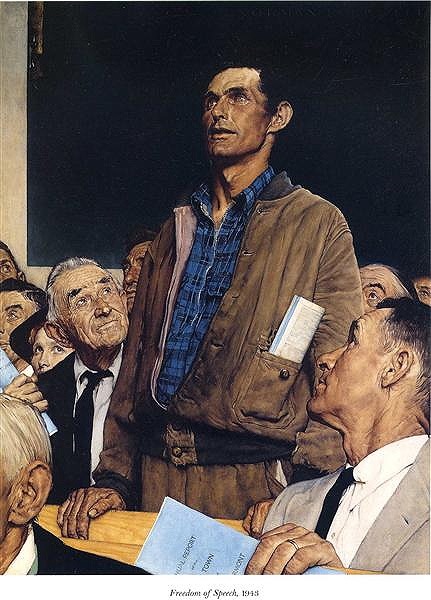
Norman Rockwell: Freedom of Speech (1943)
© by Norman Rockwell under Fair Use
"I ain't buying anything promoted with screeches."
Maybe The Founders intended elections to deeply upset the public, lest we grow lax in our responsibilities as citizens. During election season, our much-vaunted freedom of speech seems to expand into what I might more reasonably insist seems more like FreedomOfScreech. The most fantastic fictions masquerade as facts while facts cower in corners until after ballots get counted. We claim that voting amounts to our sacred right, though we treat it with little reverence. The SOB who never once seemed interested in representing you or me suddenly seems redeemed, clothed in whatever raiment seems most appropriate to appeal to a divided electorate, while deliberately further dividing that electorate. My mute button gets overworked as the same misrepresentations appear as gospel. I wonder why that local television station agrees to carry that advertisement and they respond with vague references to civic duty, which seems more of an indenture to me. At least election season serves to dramatically reduce my television viewing.
I apparently inhabit a backwater of political discourse since I've seen blessed few of the ads.
TinyTyranny

Mir Sayyid Ali: Persian Miniature Complex Palace Scene (1539–1543)
"I might have been more right than I knew."
Most of us sense the significance of anything larger than us. Big might not necessarily be better, but it's sure a whole lot more noticeable. We learn early not to sweat small stuff, for small doesn't usually represent any obvious threat. Dedicated to making some significant difference, we focus upon the bigger chunks, ones where, if we can influence them, we'll probably get noticed. Appearances aside, this bias for the big might imperil us most, for small changes, those which go unnoticed, seem to more readily replicate than the huge gallumping kind which quickly raise our defenses. An almost indiscernible one percent change, if persisted over time, can leave us wondering why in a radically different place. A spark becomes a blaze. A drip grows into a flood. We see ample evidence that tiny can become tyrannical, yet a TinyTyranny usually slips right through our defenses.
Innumeracy explains some of this condition.
Homering
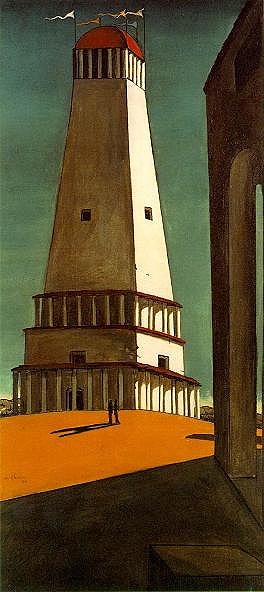
Giorgio de Chirico: The Nostalgia of the Infinite (1911)
"I might, finally, at last, accept that my future's fully back in my hands now."
As I noted yesterday, I caught myself feeling lost in the perhaps necessarily disorienting transition between then and WhatNext. I must have expected my world to crisply snap back into some poorly-remembered before state after The GrandOtter departed for her next adventure, but except for the suddenly empty guest bedroom and bath, the place remained disappointingly the same, essentially unchanged save for a notable absence of a persistent background hum. Every displaced routine remained disrupted and seemed reluctant to snap back into what I imagined to be its former place. Worse, I felt a deep reluctance to simply pick up the former pace, to fill the suddenly empty spaces with fresh ambition and activity. I sheltered more or less in place, staring at a too familiar face. Home would refuse to meet me halfway. I'd have to engage in some dedicated Homering.
Homering refers to a complicated process by which an imagined outcome becomes an actual one leached of nostalgia and Utopian expectations.
Hollowing
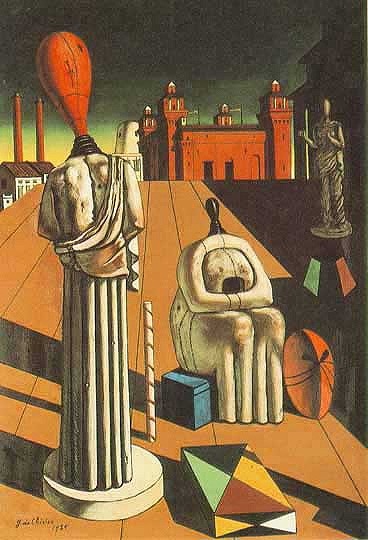
Giorgio de Chirico: The Disquieting Muses (1947)
" … a replacement obsessive purpose might shine through."
All my life so far, I've heard stories about the sweetness of success. These were fairy stories, apparently, for every one of my greatest victories have so-far most prominently produced a disorienting Hollowing instead. I might have gone absolutely all in to achieve something, only to feel upon completion the way Wylie Coyote must feel after overrunning his latest mesa top. A hollow hum replaces the rush and feathers expended in pursuit. I'm suddenly out of work, without clear purpose, suspended near the cusp of dread. I never seem to know WhatNext then, when my recent past has just slipped out of my grasp. My reward seems to be that I get to start reinventing myself all over again, this time, again, without much of an inkling of what I might want to become enough to eventually become obsessed with it. I grew up then blew up just to have to grow up all over again. Completion doesn't carry a taste, bitter or sweet. It comes to carry away accustomed engagement and leave that disquieting Hollowing behind.
Why do I always feel surprised when I fall into this limbo again? I probably shouldn't.
Lame
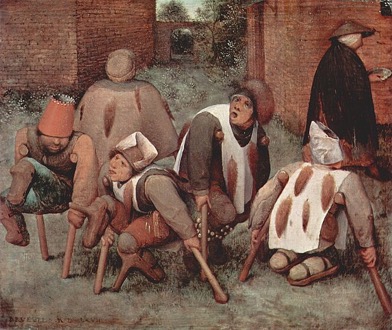
Pieter Brueghel the Elder: The Beggars (1568)
"We're all each others' metaphors here."
Max, our erstwhile kitten now budding house cat, turned up lame evening before last. He and his sister Molly had (as usual) accidentally escaped after I left the slider open and stood on the deck imploring them to come outside, and I noticed Max walking with three legs, just like the three-legged dog on my childhood paper route. That dog chased me like every other dog on that route, seemingly unperturbed over his missing leg. Max held his left front paw immobile and hesitated before heading down the long, steep deck stairs to his favorite flower bed out back. I coaxed him over with a few kitty treats and investigated for obvious damage, but I couldn't see anything troubling in the fading light. I carried him back inside while he complained.
The next morning, he was still avoiding any use of that leg, so I scheduled a visit to the Vet.
Nexting
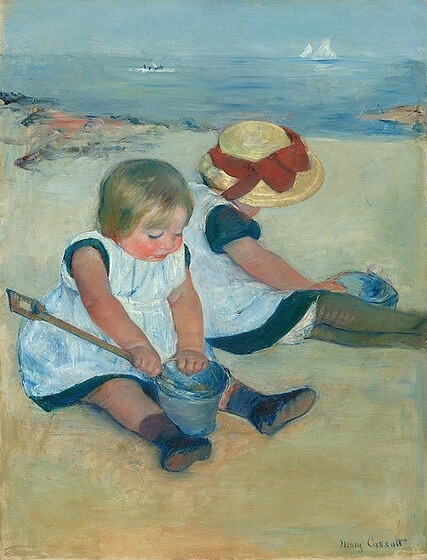
Mary Cassatt: Children Playing on the Beach (1884)
" … I eventually stick my head up and into the clouds."
The GrandOtter rented a POS truck to shuttle herself and her stuff into the next iteration of her life. Balding tires, weary interior, frightening play in the steering wheel, that truck represented everything it should have represented to properly convey her into her next chapter. My right thumb powered my first escape across a hundred miles of scabland and up and over the great Cascades, my possessions contained in a small knapsack and a flimsy guitar case. The conveyance should rightly seem inadequate, for it's not about any present, but whatever comes next. In that moment of separation, the present has already receded seemingly to break trail for its protagonist to follow. These transitions drip with potential and require nothing but the barest shell of conventional support. Another great adventure, a Nexting, commences.
When I arrived on the other side, I discovered that I had been wholly unprepared to properly inhabit the place.
Lasts
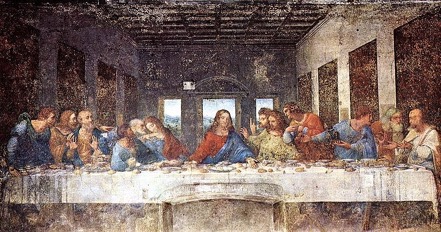
Leonardo da Vinci: The Last Supper (1498)
"Long gone. Never lost."
As a departure nears, before my thoughts shift to whatever might come next, they scan around for Lasts. The last supper. The last breakfast. That last nuzzle from one of those cats who imprinted on me during my stay. I might be here today, but I will most certainly be gone by this time tomorrow, so I try to absorb just as much of the atmosphere here before forfeiting it in favor of fresh adventure. I feel loss most intensely just before the countdown finally concludes. I feel deep tinges. In one of those moments, I swear that I'd abandon every thought of actually departing if that act might freeze everything precisely where it seems to be in that moment. Adventure seems a false promise right then, a down trade. I'd easily barter back my newly-acquired handful of magic beans to recover my reliable old cow.
Time tangles then, for Lasts more properly reside in faulty memory.
EmptyNestoring

Francis Flora Bond Palmer: Across the Continent:
"Westward the Course of Empire Takes its Way", 1868
[James Merritt Ives (printer), Currier and Ives (publisher)]
"We revere New Beginnings, for only they can turn our fears into our dreams come true."
The grandparent birds seem almost amused at just how confused the exit seems, for they've, between them, done this at least a hundred times. They possess a rhythm between them that would surely guide their wings, but there's no known way to ever transfer that sort of experience. So the fledglings flap and flop their way, first close, then progressively further. None simply fly away. What might have taken a day with experienced wings will likely take a few while learning, remembering what a short time ago flying amounted to simply mounting the edge without ever actually departing before settling back in for another brought-in supper. Chicks grow exclusively exponentially, though, and nesting space eventually disappears. Somebody's finally got to leave, and the nest always was the grandparent birds' place, never theirs. Birth places, even re-birth places, only ever come in the form of future departure points, and one of those points eventually arrives.
"At least they're heading West," you say, since East somehow seems so retrograde.
GhosTown

Jan van Eyck: Saint Barbara (1437)
"I am the ghost haunting this GhosTown."
For many, myself included, errand-running had become our only socialization. We'd either be alone at home or out to the shops. We acknowledged that this form of interaction lacked intimacy, as we only rarely knew those we encountered, but they nonetheless performed a valuable service for us. Their presence proved reassuring that we might not actually be quite as lonely as we usually felt. We could exchange pleasantries with somebody more sociable than a cat while temporarily feeling part of a bustle. Since The Damned Pandemic descended, though, those Main Streets and town centers have ceased attracting. We're more likely to slink around the edges of them rather than attempting anything like our former full immersions. Our social lives have retreated into suspension. We might still warmly anticipate a post office visit if only to revel in the long-familiar context of it, clerks always chatty from standing so very near the center of the universe. One does not very often visit the post office.
I shop as if I were deep sea diving now, checking my gear before entering, and lingering no longer than absolutely necessary.
Dyeignosis
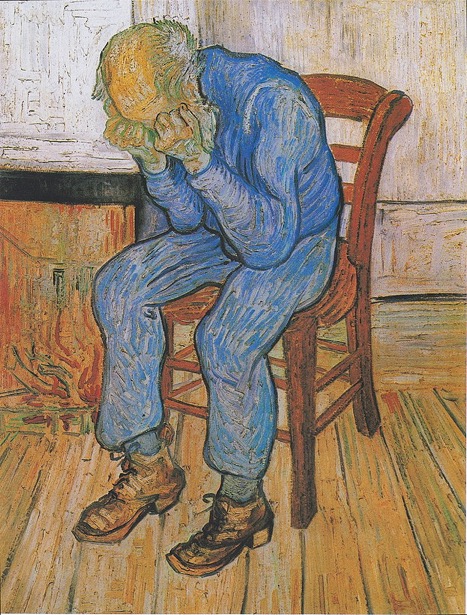
Vincent van Gogh: Sorrowing Old Man (At Eternity's Gate) (1890)
"I am my Dyeignosis, which I acknowledge has been the death of my former self."
I have lived most of my life Dyeignosis-free. This state left me with what many might consider a thin identity, for I found myself unable to sort myself into any of the more popular categories. Allergic to nothing that I knew of, I roamed free of imposed restrictions, enthusiastically joining the Gluten Appreciation Society. I freely consumed peanuts at will. True, through the eighties, during the height of the now-infamous cholesterol terror, I subsisted on skinless chicken breasts and oat groats, but before and after I put most omnivores to shame. I avoided soda pop and fast food, not due to any externally-mandated restrictions, but thanks to what I imagined to have been a refined palate and uncommon sense. While diagnosed with high cholesterol, my identity changed. I became a pre-avenging angel, steadfastly refusing pork and beef, charged with protecting my sacred health. My cholesterol numbers never wavered, regardless of my prescription or exercise routine, and when that life-preserving prescription was recalled as a danger to my health, my doctor and I decided to rescind the earlier dire diagnosis. I slowly re-entered the general population without further restrictions. Once that Dyeignosis devolved back into a recognition of a personal eccentricity, that miserly portion of me withered and disappeared, opening twenty-five years of near perfect health and serenity.
Later, The Muse encouraged me, as only The Muse can encourage anyone, to submit to fresh dyeignoses.
BreakingPoint

Henry Fuseli: The Nightmare (1781)
"It's a long, hard road."
Every day carries a hint of irrecoverability, each one new and subtly different from every day before it. A very few days arrive carrying the clear threat of a radical BreakingPoint with the past, a clear sense that forever after, no day will likely seem terribly similar again. A death or a divorce brings a dismemberment along with the dread certainty that no subsequent surgery will ever reattach whatever was torn asunder. One wonders What Next? without mustering anything like a reassuring impression of what that might entail. These discontinuities might seem curiously reassuring, marking an end to what had become for almost everyone, an increasingly intolerable situation, but also inject a shit ton of uncertainty into the proceedings. A deeply disturbing unknowing settles in to wait for a fresh opening in the storyline. Above all, everything seems anything but fine in that moment. One proceeds, anyway.
I have been scampering along the eroding cliff edge of just such a BreakingPoint for the last few weeks, terrified over where this story might next take me and those I care about most in this world.
ExitStrategy

Carlos Schwabe: La mort du fossoyeur (Death of the gravedigger) (1895)
"Just imagine the depth of character I'm creating."
Fifty years ago, I was one autumn twilight driving my mother's '63 VW Beetle, which we lovingly referred to as The Helicopter because it sounded like a helicopter, up onto Washington State's Snoqualmie Pass and into a snow storm. An old friend who was riding along dispensed some advice which has since become one of my guiding homilies of life. He said, "Tuck in behind a truck and keep one foot in the ditch." His logic seemed flawless. A commercial truck driver very likely had much more experience than I driving through snow in the dark, and his vehicle was likely much more susceptible to sliding than mine, so a leading truck could serve as my early warning system when the road turned slippery. I should maintain an ExitStrategy anyway, by keeping one foot in the ditch, by remaining prepared to drive myself off to the side should the situation turn truly perilous. I continue this general strategy today, even when it's not snowy. I try to follow someone more experienced than I and I also try to maintain a fallback plan should my pathfinder fail me. I think of this strategy as a form of double indemnity, a compounded form of safety. While everyone else seems most interested in passing every slow-moving truck, I'm more likely to tuck myself in behind so that I can leverage the driver's superior experience.
I try to apply this guideline wherever I'm feeling imperiled, but this Damned Pandemic has foiled my attempts.
HidingOut

Johannes Vermeer - Girl Reading a Letter by an Open Window (circa 1657–59)
Hiding
I'm hiding, I'm hiding
And no one knows where;
For all they can see is my
Toes and my hair
And I just heard my father
Say to my mother -
"But, darling, he must be
Somewhere or other;
Have you looked in the inkwell?"
And Mother said, "Where?"
"In the INKWELL?"said Father. But
I was not there.
Then "Wait!" cried my mother —
"I think that I see
Him under the carpet." But
It was not me.
"Inside the mirror's
A pretty good place."
Said Father and looked, but saw
Only his face.
"We've hunted," sighed Mother,
"As hard as we could
And I am so afraid that we've
Lost him for good."
Then I laughed out aloud
And I wiggled my toes
And Father said —"Look, dear,
I wonder if those
Toes could be Benny's?
There are ten of them, see?"
And they WERE so surprised to find
Out it was me!
Dorothy Keeley Aldis
"They mostly don't seem to notice, anyhow."
By the time I graduated from Junior High, I had become a near master at HidingOut. The normal social pressures there had easily convinced me that I was eminently vulnerable, and I quickly learned the costs of too prominently standing out. My identity had been emerging through my tenure there, and I'd tried on innumerable different personas, quickly discovering which I could get away with and which I could not. Mistakes would receive quick and shockingly viscous peckings back into place, as if angry ducks ruled that roost. I learned to go slightly unconscious, to simply not notice much of the brutality surrounding me, for I could not imagine surviving otherwise. Each morning I performed another act of rather sublime courage, arriving on time and taking my seat just as if I was not entering a grand inquisition. I worked hard to remain unsuspicious, since suspicion alone usually served as adequate evidence that some punishment should resume. Teachers were no less unforgiving than the least of the students, for they were charged with creating future citizens from such continually unpromising material. The principal daily announced another threat over the Stalag-quality PA system, insisting that his was "a promise, not a threat." Everyone knew a threat when they heard one.
I went on to do post-graduate work in high school and beyond, and by the time I'd finished high school (or it had finished with me), I had attained a depth of transparency such that I could see right through myself, the ego had been pretty much beaten out of me.
Shirker
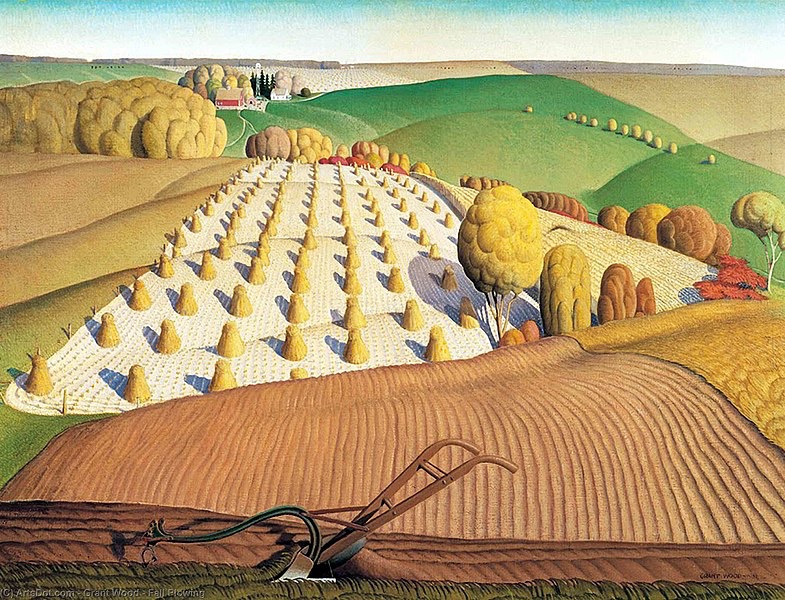
Grant Wood: Fall Plowing (1931)
"I get away with nothing."
I know myself to be, above all else, a Shirker. In my time, I've left many more jobs undone than I ever completed. I'm apt to spend a day when I should be engaging in my equivalent of Fall Plowing, plowing my way through a novel in lieu of attempting to outrun the first snow outside. I tend to leave a lot on the table. I think of myself as being more able than I ever actually deliver. I shrink in the face of even modest challenges, and I feel myself defeated at the merest rumor of conflict. I contend that I am not lazy, however, for the lazy never seem to notice the work they shirk, but fail to catch the cues that inform then that they really should be doing something. Mine's a more sophisticated sort of slothfulness, one ridden with essential guilt and built upon a solid foundation of dedicated precedent. I can usually tell when I first sense a deadline whether or not I'll ever manage to get around to actually attempting to accomplish it, but I retain the expectation on my books, never writing off the obligation. Ever! I might have become most masterful at managing the resulting residue of guilt, my constant companion and, curiously, my primary inspiration.
I sense time on my tail and I know for sure that I will ultimately lose this race.
Factsation

RAPHAEL: The Sacrifice at Lystra c.1515-6
"How low can your bottom line go?"
The Muse recalls her mom insisting that fare is what one pays to ride the bus. This glib insight almost explains how the much-maligned US Tax Code works in practice, except that fair, tax-wise, means that those least able to pay, always pay the most as a percentage of their income. A day laborer, lacking the 'tax advantages' of owning a private jet, might pay the full fare. No billionaire ever does, nor need to, because he can take advantage of receiving certain advantages not extended to the laborer. Billionaires complain about the price, but never, ever, under any circumstance, ever pay the full fare. It's as if the rich receive special dispensation for the otherwise insufferable burden of wealth. They write off with abandon, carrying forward losses to offset any unfortunate future profits. Lose a billion early in a career, and you're golden for the next couple of decades worth of tax years. Walk away from a failing enterprise, even one you ruined through gross incompetence, and your government will richly reward you. Should the laborer walk away from a job, he'll be denied subsistence support under the presumption that he must be lazy. Real welfare queens live in luxury on the Upper East Side.
Our President, he whose name I've sworn to avoid saying, reportedly deducted $70,000 in a single year for hair styling expenses, since his gravity-defying cantilevered combover is apparently a part of his brand rather than simply a translucent inability to accept encroaching baldness.
QuantiCategorization
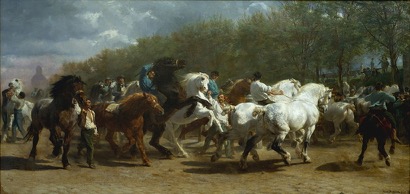
Rosa Bonheur: The Horse Fair (1855)
"I am not now nor have I ever actually been my demographic."
To produce sketches for her mid-nineteenth century painting The Horse Fair, artist Rosa Bonheur sought and received permission to dress as a man while observing dealers selling horses at the horse market held on the Boulevard de l'Hôpital in Paris. She explained that when earlier sketching at a slaughterhouse, her appearance as a woman had complicated her ability to observe regular goings on, and so she wanted to dress in the iconic smock and britches favored by male painters of the period, for she considered herself first an artist. Whatever else she might have been ranked a distant second to her presence as an artist in that context. How others perceive us can deeply affect our ability to engage in whatever we do, so most of us take care to project a persona congruent with our intentions, lest we unduly complicate our own efforts.
We live in perhaps the most prejudicial time in the history of human existence.
MountainTime

Giovanni Segantini: The Punishment of Lust (AKA The Punishment of Luxury) (1891)
" … my soul will most certainly feel more at home there."
Though I might use the same clockworks to measure time wherever in the world I might find myself, time behaves differently in different places. It moves much more slowly some places than in others, the effect influencing clocks such that they fail to register any difference. I do. Perhaps you do, too. A minute is clearly not a minute everywhere. In cities, time naturally moves more quickly, though much of it seems wasted in transit between two inevitably distant points (across town) via crowded passageways. One waits much of their time away in cities. On the prairie, time moves most regularly, with little difference from day to day to day. I figure that the featureless topography influences it, as if there's nothing for it to bounce off of as it passes through. MountainTime seems most mysterious and therefore most special. Long, deep shadows render sundials essentially useless, and twilight, both morning and evening, stretches far beyond expectations, smearing each sunrise and sunset into curiously extended events.
I consider the Pacific Time Zone to be God's Own Time Zone, probably because I gestated and was born there, and inhabited that geographical space through my formative years.
ThinAir

Jean Auguste Dominique Ingres: The Dream of Ossian (Ossians' Traum) (1813)
"Maybe this place exists solely as refuge …"
The atmosphere has seemed memorably thick over the last few weeks. Wildfires raging across The West pushed smoke around the world, blocking some people's sun through the end of summer and into an uneasy autumn. Our horizons have flamed through successive sunrises and sunsets while every exposed surface accumulated an ashy grit. Politics, too, have densified our social atmosphere, with fear sweat creating a persistent ground fog of dread as a mortally weakened President throws distracting tantrums, spewing idle threats. The Damned Pandemic continued playing off our tenacious innumeracy, a flickering flame quietly spreading through virgin timbre, our ears deafened by disbelief. This time will be recorded as neither the best nor the worst of times, but it might well be remembered as a crime wave, with thieves weakening every institution and corruption seemingly corroding everything it touches, and touching pretty nearly everything. The future from here appears cloudy with the certainty of torrential rains, a threatening Old Testament scenario.
The Muse and I feel fortunate to have found Pilgrimage calling us up and out of our metastasizing daily routines into ThinAir, where we can't figure out how to make the television work.
MisDisInformation

Joseph Wright: The Corinthian Maid (1782-1784)
[Josiah Wedgwood, the pioneer of pottery manufacturing, commissioned this mythological scene that illustrates the invention of the art of modeling bas-relief sculpture. Wedgwood’s own fired-clay vessels, decorated with low reliefs, would have been seen by an eighteenth-century audience as the aesthetic descendants of this ancient Greek maiden’s attempt to preserve her beloved’s profile.
The girl was the daughter of a potter in Corinth. Her boyfriend was about to embark on a perilous journey to foreign lands, taking only his spear and dog. As a memento, she traced her sleeping lover’s silhouette onto the wall. Her father then used the drawing to model a clay relief, which he baked in his kiln to create a ceramic keepsake.] NGA.gov
"The silhouette was never the lover …"
When the fabled Corinthian Maid traced her lover's silhouette, she had no intention of accurately representing him, but of hopefully capturing some significant, representative part of his presence. She understood that the small subset of his many dimensions she traced on that wall would fall far short of replacing him in his absence, but hoped the resulting bas relief might serve as enough reminder to spark some deeper sense of him than mere memory might provide. She produced information about him, but without the expectation that this information might adequately replace him. Her work produced a placeholder for his presence, information without definition.
We've been wrestling to make this distinction ever since, and probably well before that Corinthian Maid scribbled her lover's outline on that wall.
Pilgrimage
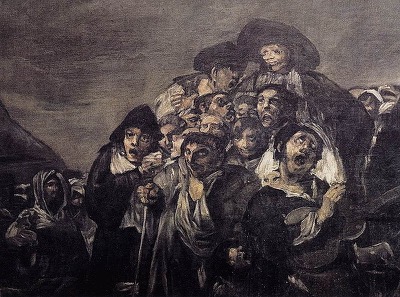
Francisco de Goya y Lucientes - A Pilgrimage to San Isidro (between 1820 and 1823)
[The theme of the loss of identity in crowds in this painting can be seen as a precursor to expressionist painting (en.wikipedia.org)]
"Having left as someone else, he returns with his freshly blessed self again."
It might be a curiosity unique to the criminal mind to believe in the concept of a clean getaway, for there are none. One might wish there were such a thing, and even deeply believe that they have pulled one off, but once fleeing, the possibility of getting caught remains until you're arrested, and until then, you're haunted by the prospect of being found out, more refugee than free. I suppose the more dedicated sociopaths can convince themselves that they got away Scott-free, but even they are actually fleeing, even if they don't acknowledge this fact. If only they could leave themselves behind like they left the scene of the crime, they might actually escape. The fundamental problem with getaways lies in trying to flee one's self, but that one cannot be left behind. The old life might be readily abandoned, but the old self insists upon tagging along, and the old self, however unwanted by the prospective escapee, shows up on wanted posters and the gunman cannot help but drop into old haunts. Somebody will sooner or later spot them there.
Contrary to every airline advertisement ever written, there are no getaways, not really.

